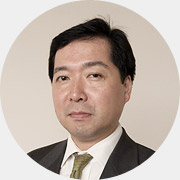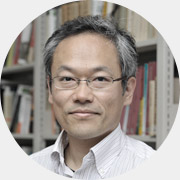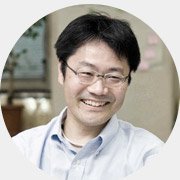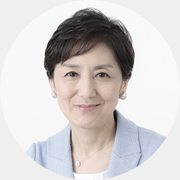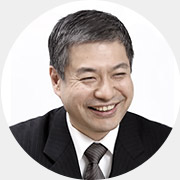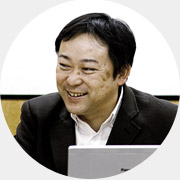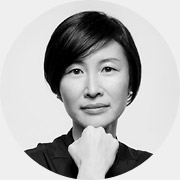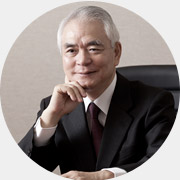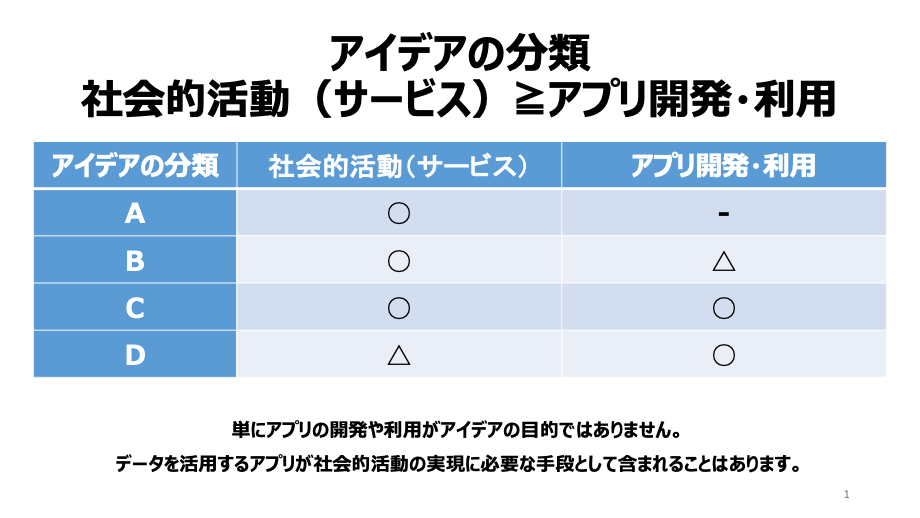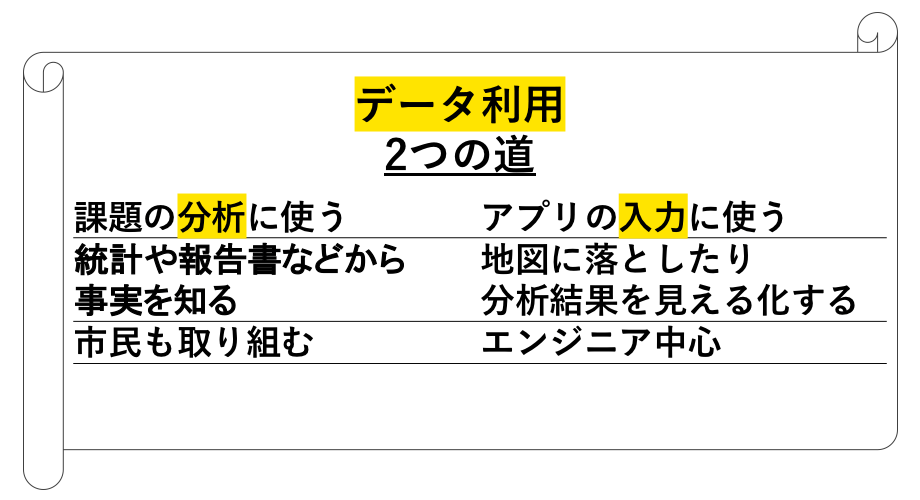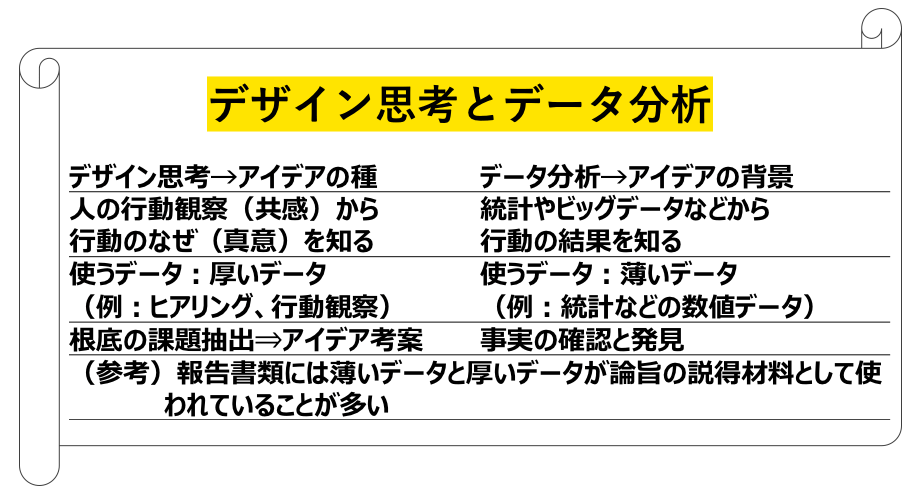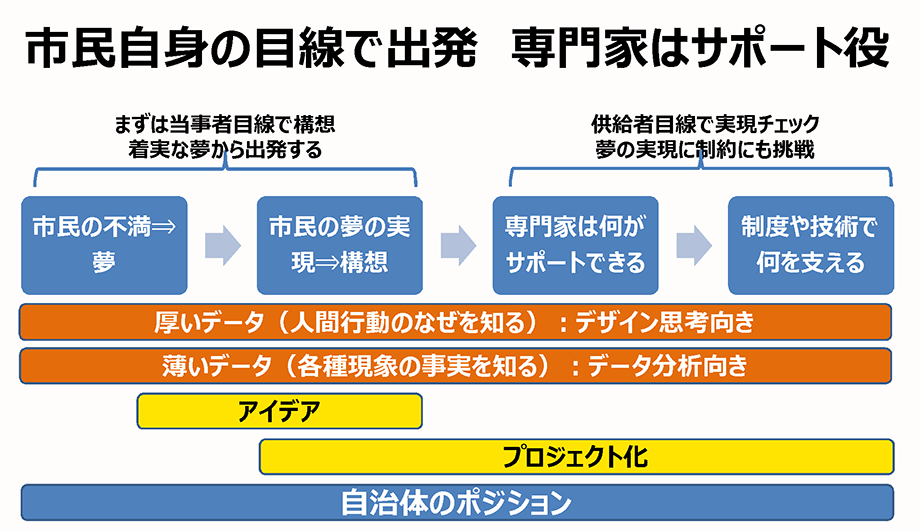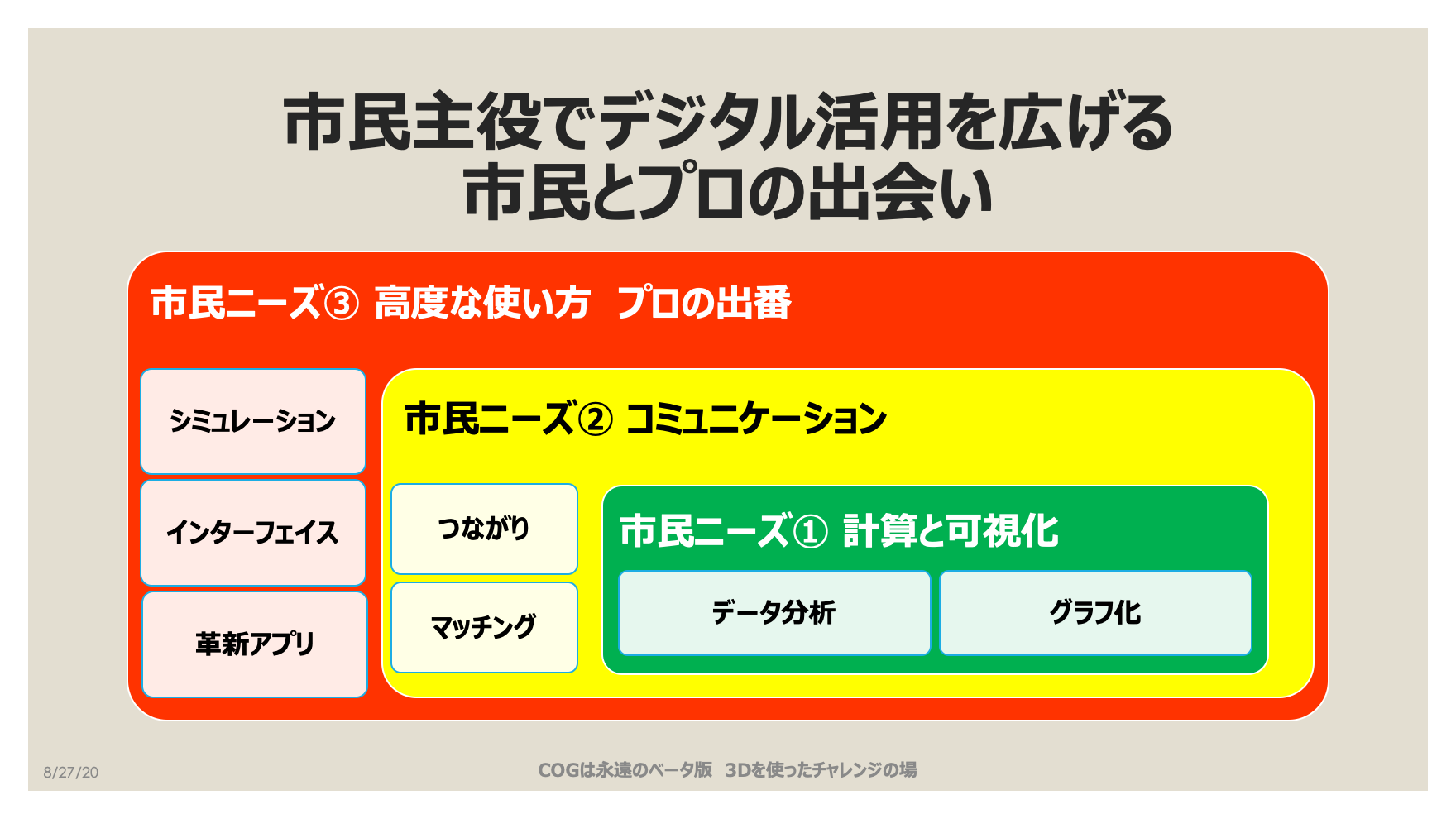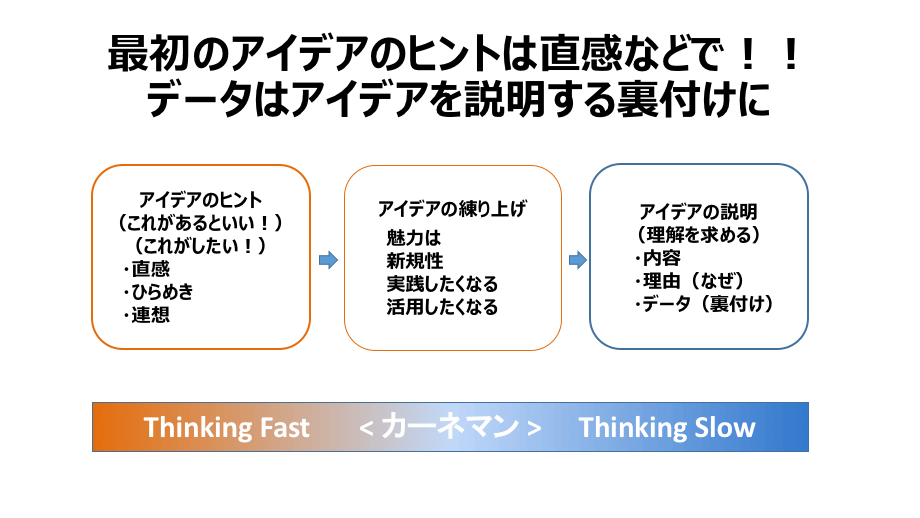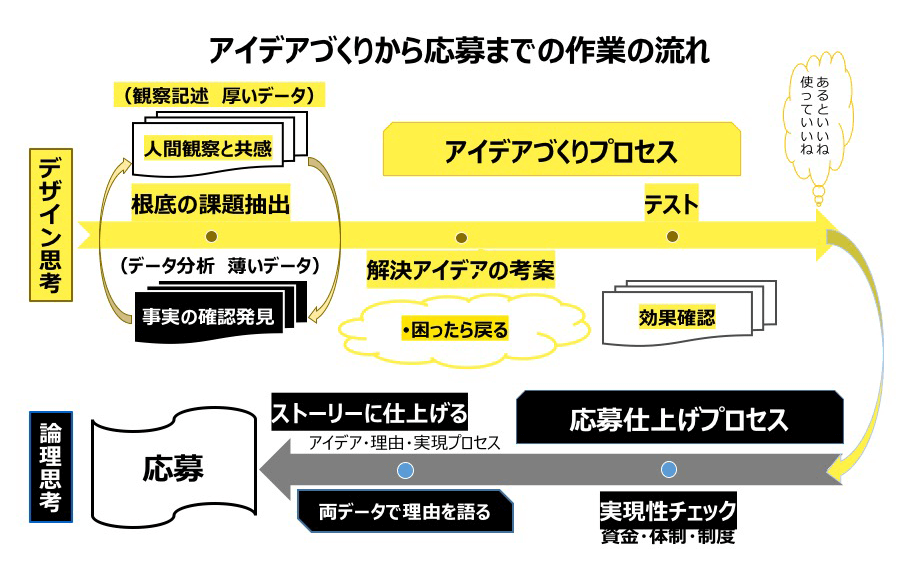Primary screening results一次選考結果
As a result of the preliminary selection based on the document review, the COG2020 Steering Committee has decided to handle the following on the open review day scheduled for February 28.
- - 10 ideas for COG2020 final public review
- - 13 ideas for COG2020 mini-presentations
- - 22 ideas for COG2020 poster exhibition
Out of the 45 ideas submitted, the following 10 ideas have been selected for the final Open Review!
A list of all projects can be found here.
Ideas for Final Open Review
by region
-
Team Bird Run
Muroran City, Hokkaido
7. Civic pride, tourism 9. issues bearing in mind the social changes that the COVID-19 will bring 10. Others: Migration and Settlement
Regional Issues: I want you to be active and supportive in Muroran all the time! I want those of you who are active outside the city to be active in Muroran someday!
Idea Name: Bird Run
-
MTI Planning Department
Muroran City, Hokkaido
3. urban development and transportation 9. issues bearing in mind the social changes that the COVID-19 will bring
Regional Issues: Muroran's traffic needs to be more convenient!
Idea Name: A system to reduce the stress of waiting for buses for university students and university neighbors, created by university students at Muroran Institute of Technology
-
Future Disaster Mitigation Division
Meguro-ku, Tokyo
5. Crime prevention and disaster prevention 9. Issues with a view to the social changes that the COVID-19 will bring
Regional Issues: Appropriate evacuation behavior in coronary disasters
Idea Name: My Hinan Hyoumei
-
KAMA-gination
Kamakura City, Kanagawa Prefecture
1. Aging, nursing care, medical care, health 2. Child-rearing, family and education 3. urban development, transportation 4. Environment and Energy 5. Crime prevention and disaster prevention 6. Industry (primary, secondary, tertiary) and work style reform 7. Civic pride, tourism 8. Smart City, Smart Citizen 9. Issues with a view to the social changes that the COVID-19 will bring
Regional Issues: Realization of "Kamakura, the City of Work" and "Kamakura, the City Where I Want to Live and Continue to Live
Idea Name: Traffic Jam Gomen App
-
Echizen City Future Planning Team
Echizen City, Fukui Prefecture
10. Other: Any theme is acceptable as long as it is in line with the awareness of the issue.
Regional Issues: A multicultural city created together with love for one's hometown
Idea Name: Creating a Well-being Town for the Ever-increasing Number of Foreigners, Helping Each Other Regardless of Nationality - Five Approaches from Real and Digital Perspectives
-
Fukui Prefectural Takefu Higashi High School Hino・Quest
Echizen City, Fukui Prefecture
10. Other: Any theme is acceptable as long as it is in line with the awareness of the issue.
Regional Issues: Young people take on the challenge of revitalizing their community while connecting with diverse people in the community.
Idea Name: Happy Project x High School Students = Hino-Quest Creating local happiness from the perspective of high school students while connecting with diverse people in the community
-
fromHANKEI3m
Kyoto City, Kyoto Prefecture
2. Child-rearing, family and education
Regional Issues: Promoting Male Family Involvement in the Promotion of "True Work-Life Balance
Idea Name: HANKEI 3m: Toward a relationship where we can discuss our true feelings with those closest to us
-
Web Business Group
山口県宇部市
8. Smart City, Smart Citizen 9. Issues with a view to the social changes that the COVID-19 will bring
Regional Issues: Ideas for a sustainable society that is not defeated by the COVID-19virus infection
Idea Name: Ube Sign
-
Tamana After-School Community Creation Club
Tamana City, Kumamoto Prefecture
1. Aging, nursing care, medical care, health 2. Child-rearing, family and education 3. urban development, transportation 8. Smart City, Smart Citizen 9. Issues with a view to the social changes that the COVID-19 will bring
Regional Issues: Starting and managing a good third place
Idea Name: Open space for people to connect
-
English name: VONS (Volunteer by Okinawa Next generation and Students)
Japanese name: Volunteer by Okinawa Next generation and StudentsNaha City, Okinawa Prefecture
1. Aging, nursing care, medical care, health 2. Child-rearing, family and education 3. urban development, transportation 4. Environment and Energy 5. Crime prevention and disaster prevention 6. Industry (primary, secondary, tertiary) and work style reform 7. Civic pride, tourism 8. Smart City, Smart Citizen 9. Issues with a view to the social changes that the COVID-19 will bring
Regional Issues: New approaches to solving local issues in Corona Damascene
Idea Name: ~Student, Adult, and Community Collaboration~ MUG Mug Food Project
Mini-presentations: 13 (sorted by region)
-
Rediscover Tsuruoka! Project
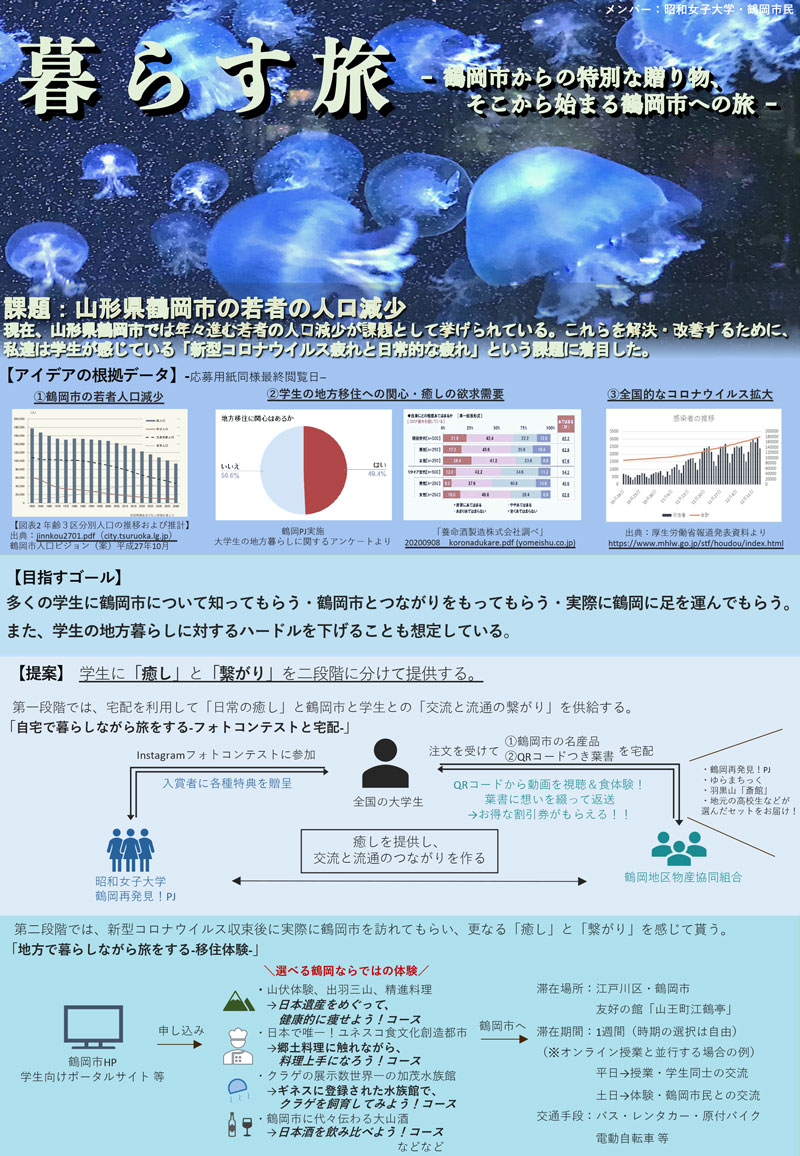
Rediscover Tsuruoka! Project
Tsuruoka City, Yamagata Prefecture
Regional Issues: Developing a business plan to attract young people to Tsuruoka City
Idea Name: A Journey to Live - A special gift from Tsuruoka City, and a journey to Tsuruoka City that begins with it
 PDF
PDF
-
Regional Public Transport Team, Abe Seminar, Faculty of Sociology, Daito Bunka University
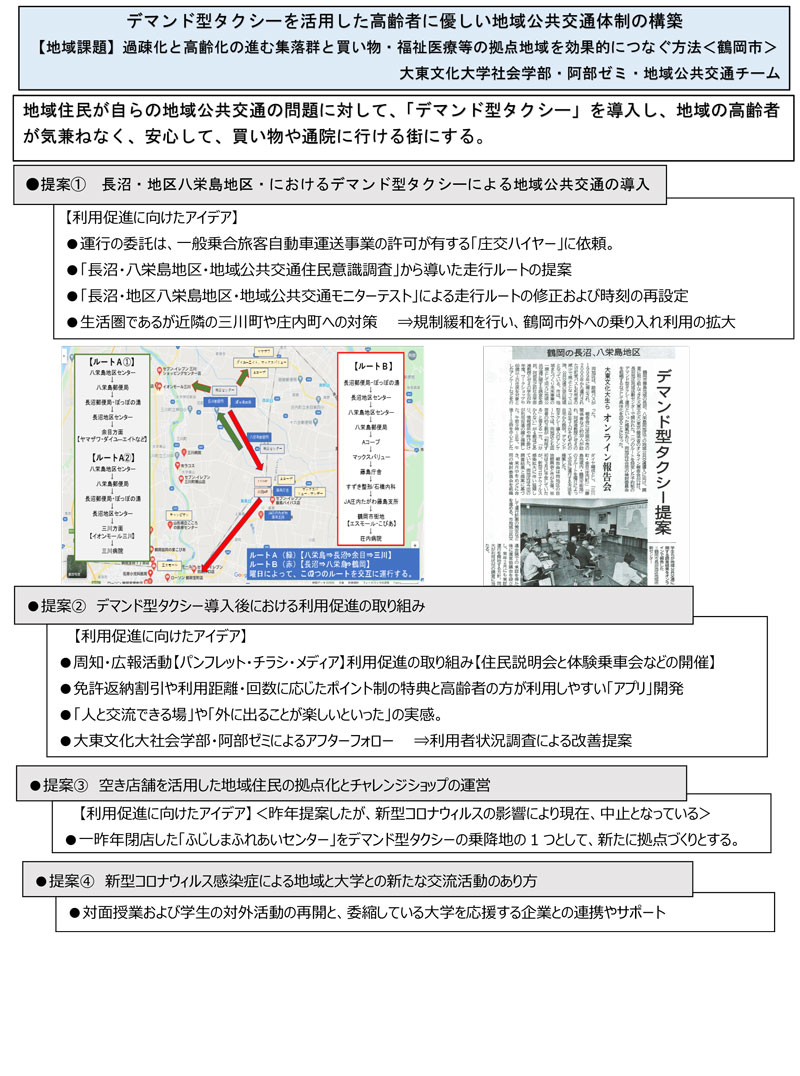
Regional Public Transport Team, Abe Seminar, Faculty of Sociology, Daito Bunka University
Tsuruoka City, Yamagata Prefecture
Regional Issues: 過疎化と高齢化の進む集落群と買い物・福祉医療等の拠点地域を効果的につなぐ方法
Idea Name: デマンド型タクシーを活用した高齢者に優しい地域公共交通体制の構築
 PDF
PDF
-
Michele Corporation
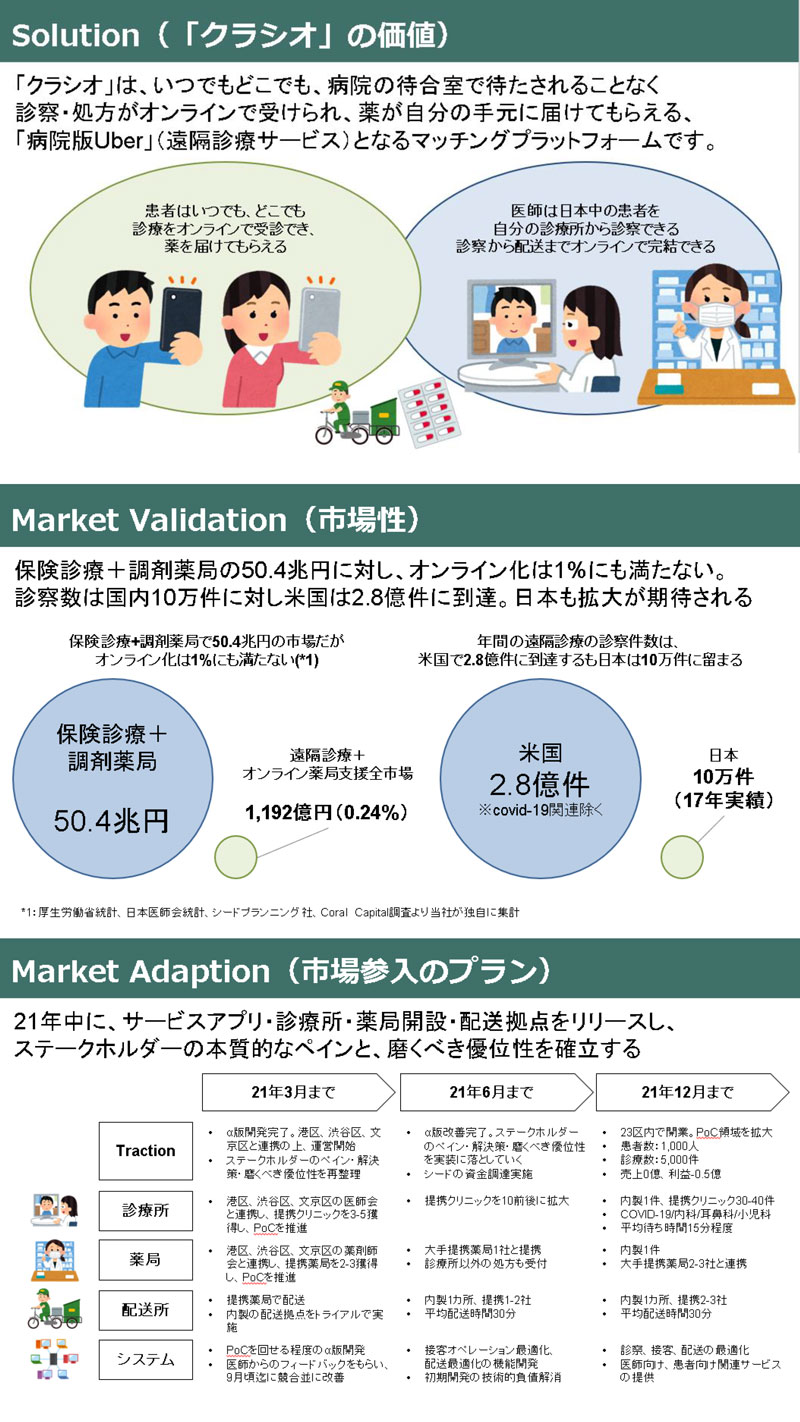
Michele Corporation
Minato-ku, Tokyo
Regional Issues: 5Gを活用して港区をより楽しい、住みやすい、働きやすい、訪れやすい、過ごしやすい、魅力的な街に。
Idea Name: 遠隔診療・遠隔服薬指導・薬配送プラットフォーム「クラシオ」による三密回避と健康増進の推進
 PDF
PDF
-
Food Loss Seminar, Department of International Agricultural Development, Tokyo University of Agriculture
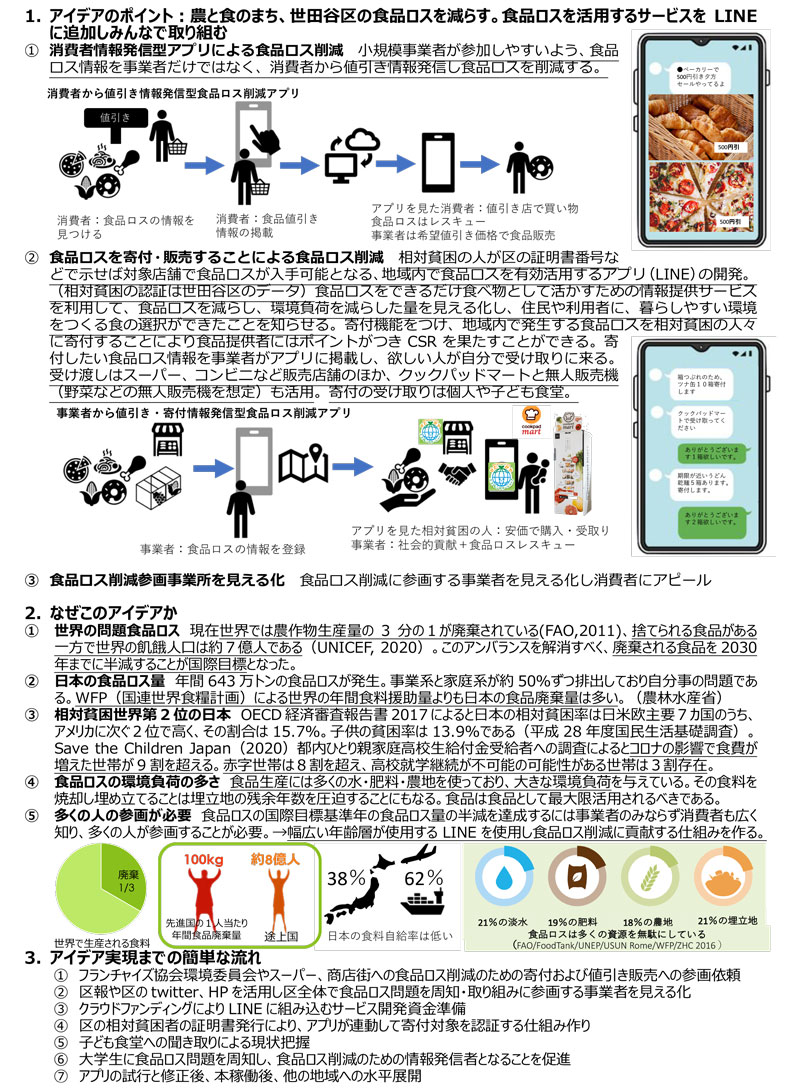
Food Loss Seminar, Department of International Agricultural Development, Tokyo University of Agriculture
Setagaya Ward, Tokyo
Regional Issues: Efforts to reduce food loss
Idea Name: A service that makes food loss as food, offers discounts and donations, makes efforts to reduce food loss visible to consumers, and supports each other in the community by earning points for social contributions.
 PDF
PDF
-
Tama City Youth Conference
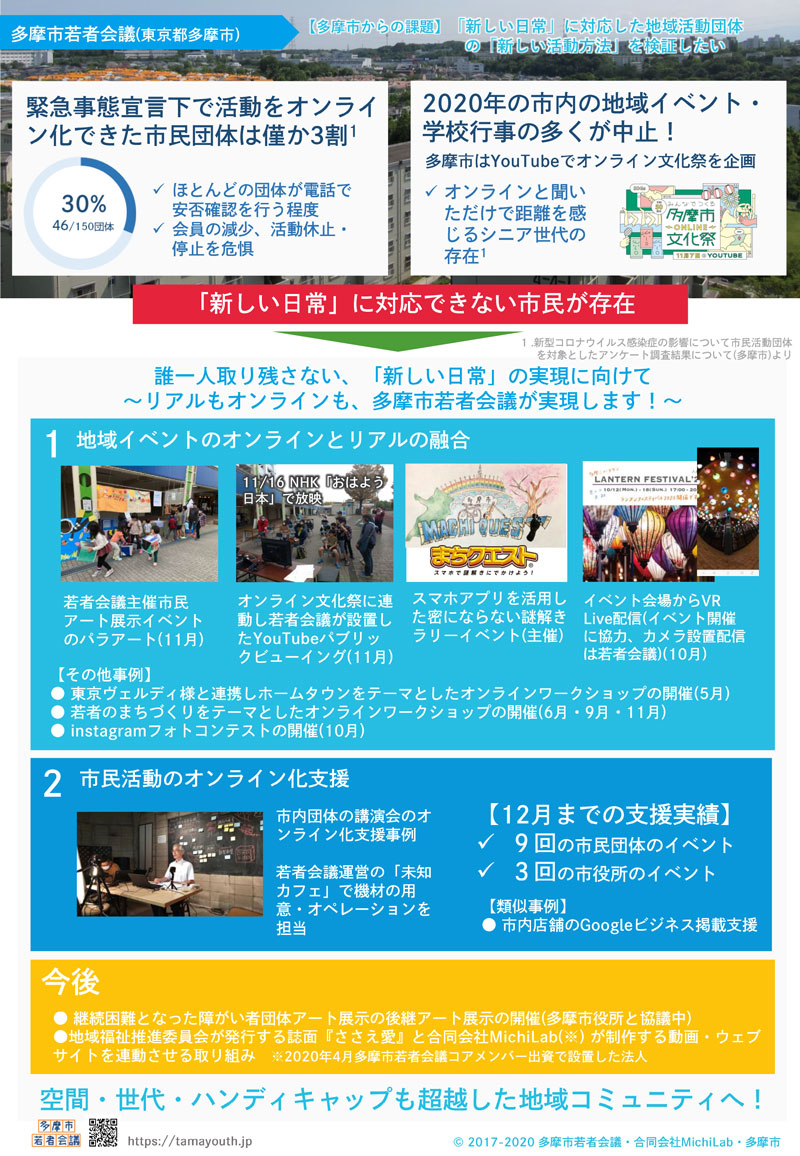
Tama City Youth Conference
Tama Ward, Tokyo
Regional Issues: 「新しい日常」に対応した地域活動団体の「新しい活動方法」を検証したい。
Idea Name: 誰一人取り残さない、「新しい日常」の実現に向けて~リアルもオンラインも、多摩市若者会議が実現します!~
 PDF
PDF
-
Yokohama Kinoko Samurai
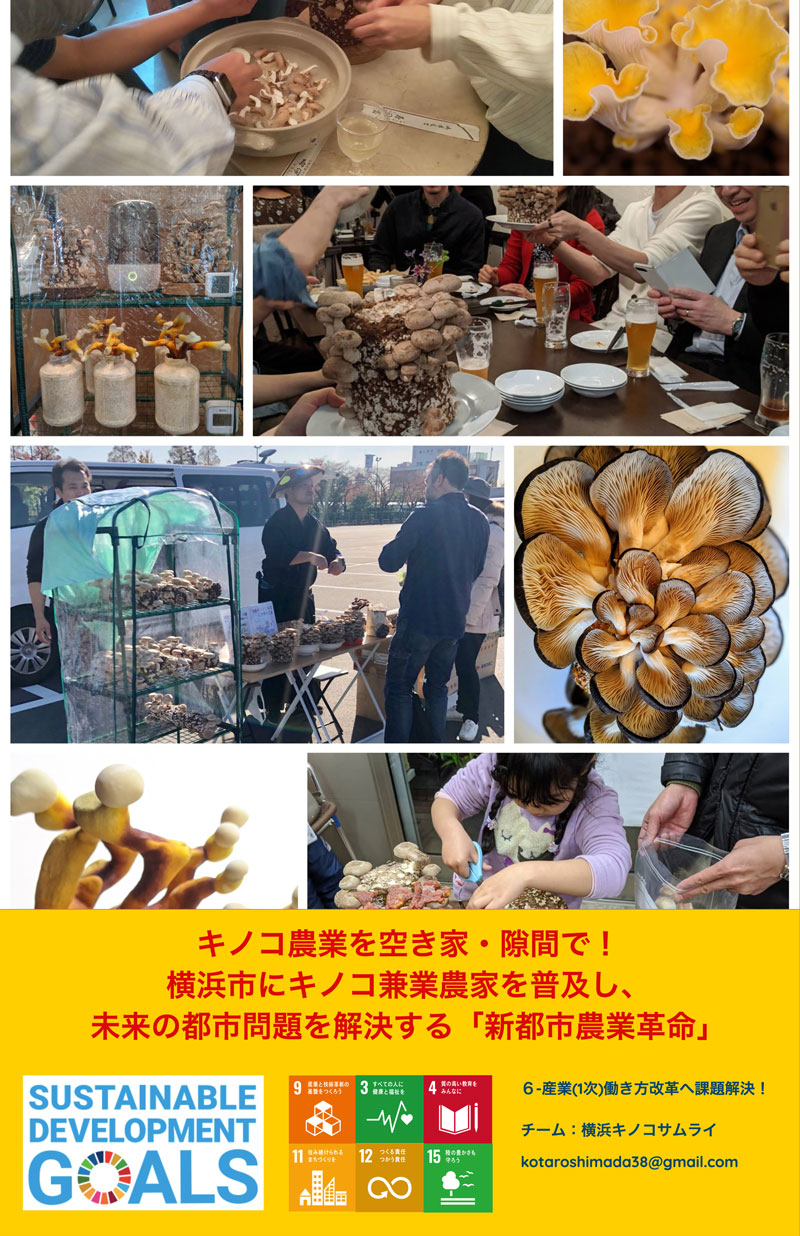
Yokohama Kinoko Samurai
Yokohama City, Kanagawa Prefecture
Regional Issues: Creating new lifestyles in large cities to overcome the COVID-19
Idea Name: "Urban Mushroom Farming Revolution" to solve future urban problems by spreading mushroom dual-career farmers in Yokohama through vacant houses and gap cultivation!
 PDF
PDF
-
Code for SUSONO
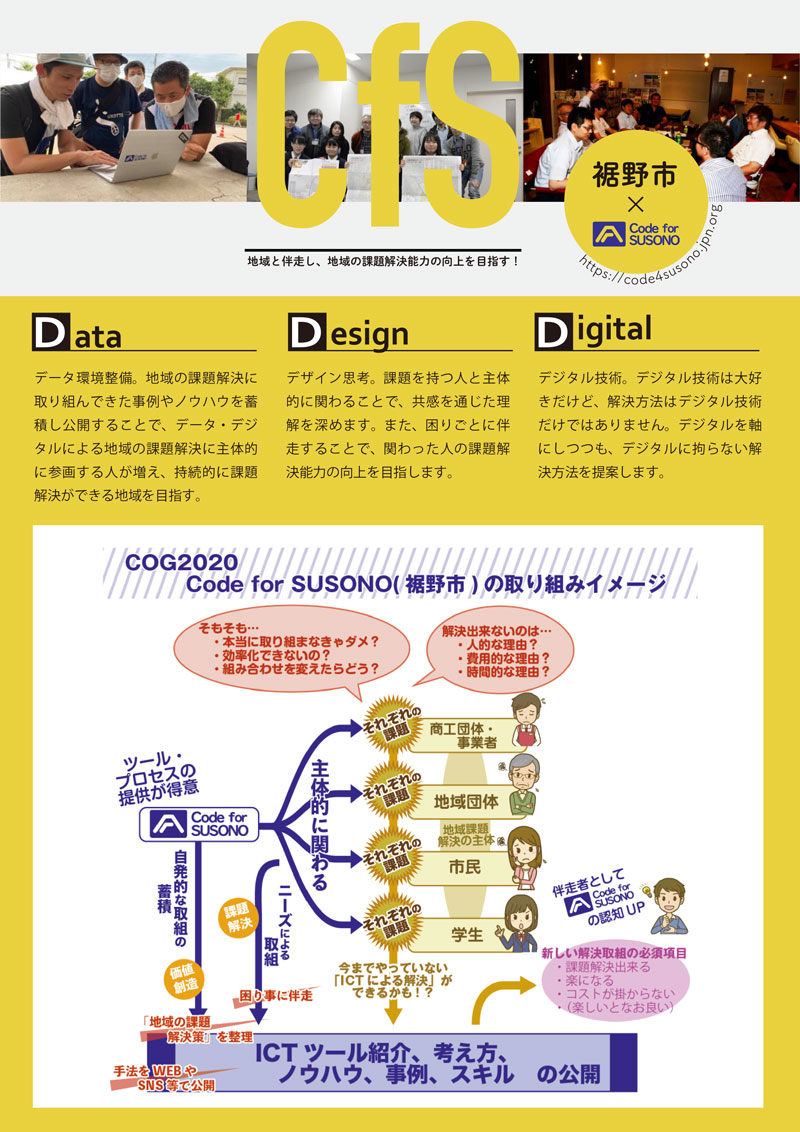
Code for SUSONO
Susono City, Shizuoka Prefecture
Regional Issues: データ・デジタル・デザインで支える地域の困りごと解決力向上
Idea Name: 地域の裾野まで届け!課題解決力向上の仕組み構築
 PDF
PDF
-
Omihachiman RAKUICHI Executive Committee
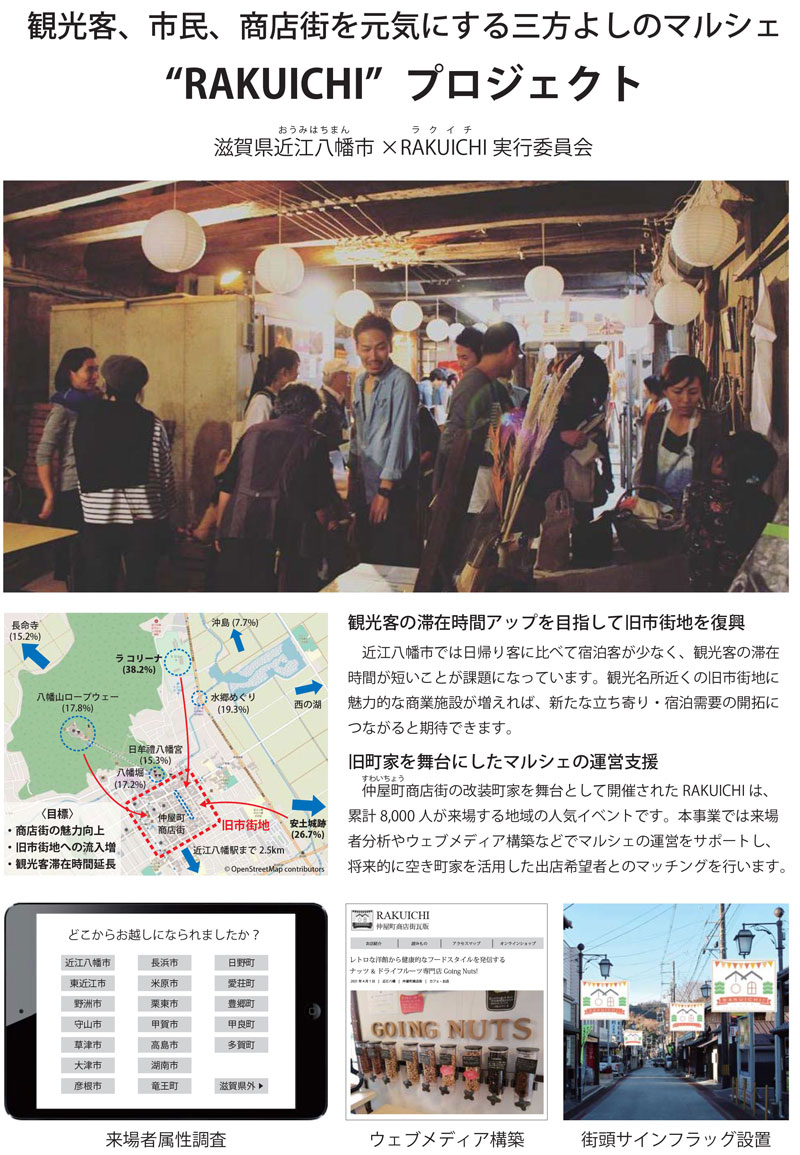
Omihachiman RAKUICHI Executive Committee
Omi Hachiman City, Shiga Prefecture
Regional Issues: 「住んでよかった、訪れてよかった、もう一度訪れたい」持続可能な観光地域づくり
Idea Name: 観光客、市民、商店街を元気にする三方よしのマルシェ”RAKUICHI”プロジェクト
 PDF
PDF
-
Human Resource Bank Signal TE to TE
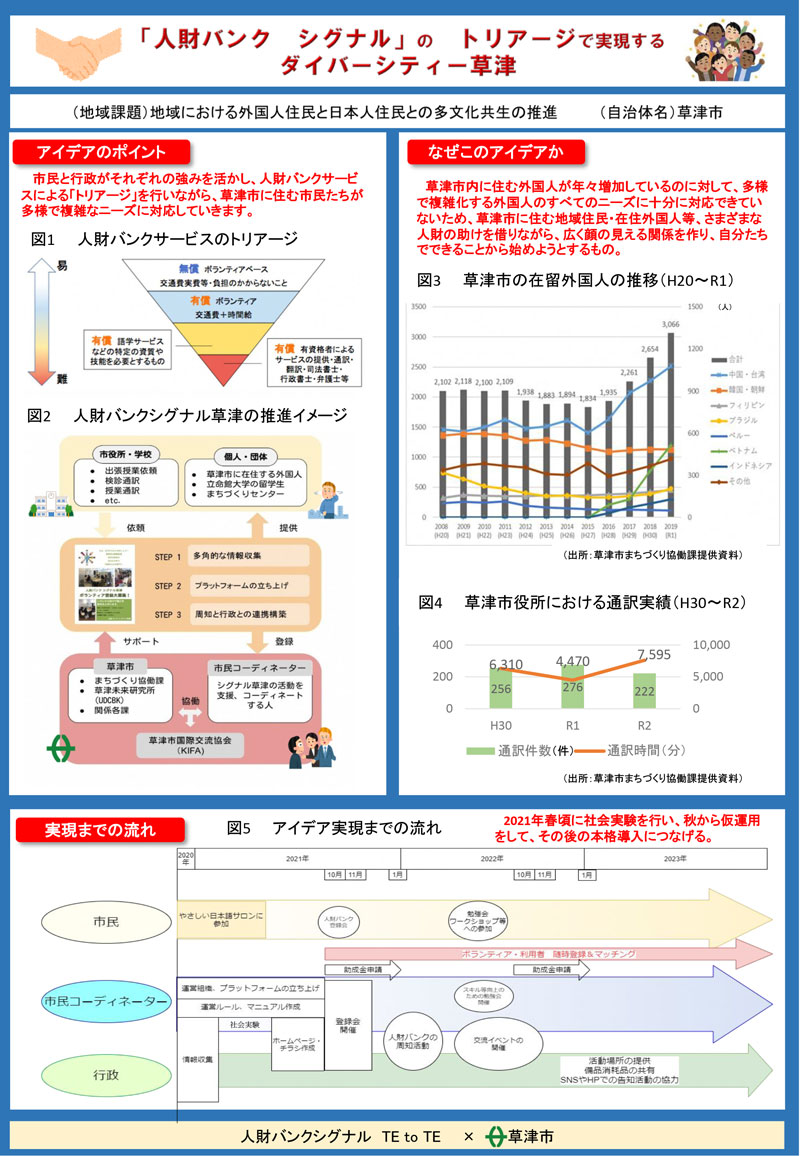
Human Resource Bank Signal TE to TE
Kusatsu City, Shiga Prefecture
Regional Issues: 地域における外国人住民と日本人住民との多文化共生の推進
Idea Name: 「人財バンク シグナル」のトリアージで実現するダイバーシティー草津
 PDF
PDF
-
The Fun-Filled, All-You-Can-Connect Suminoe-ku Project
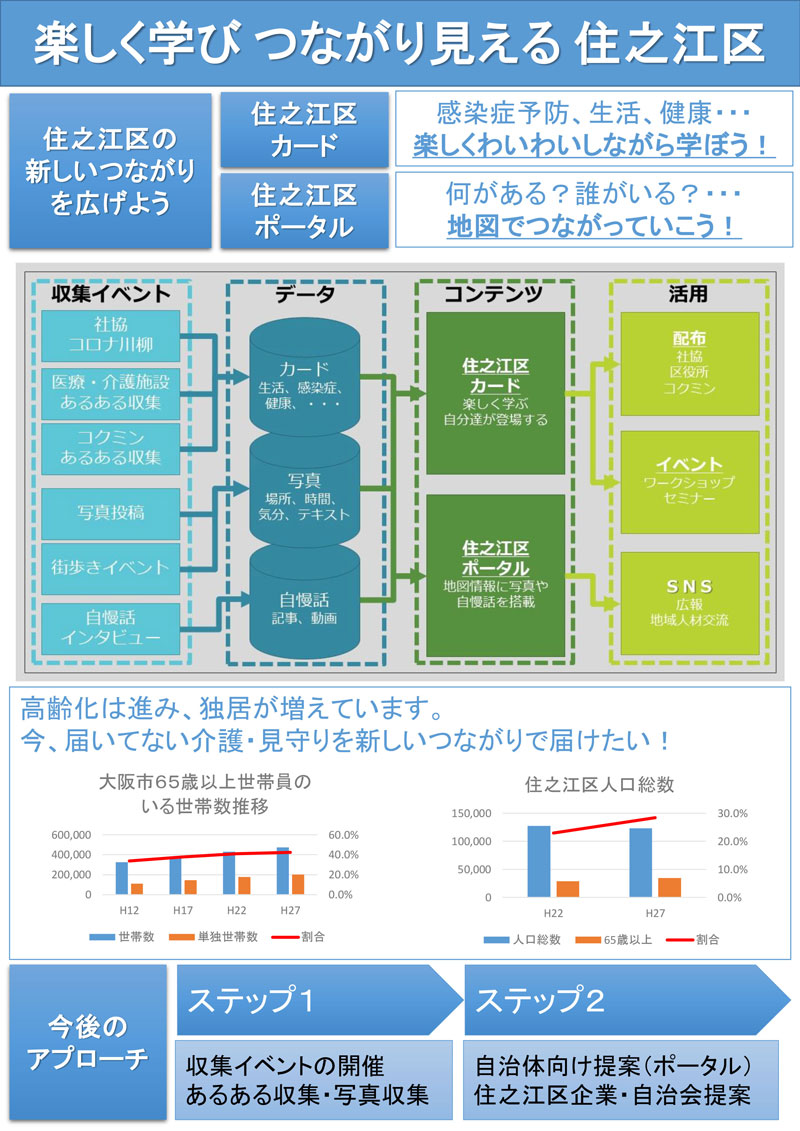
The Fun-Filled, All-You-Can-Connect Suminoe-ku Project
Suminoe Ward, Osaka City, Osaka Prefecture
Regional Issues: 新型コロナウイルス感染症がもたらす様々な課題への対応とICT利活用の促進
~ふだんからの介護サービス・要援護者の見守り支援や災害時対応へのアイデア募集~Idea Name: 楽しく学びつながり見える住之江区
 PDF
PDF
-
Data Cradle Incorporated Association Machi-Care Management Team
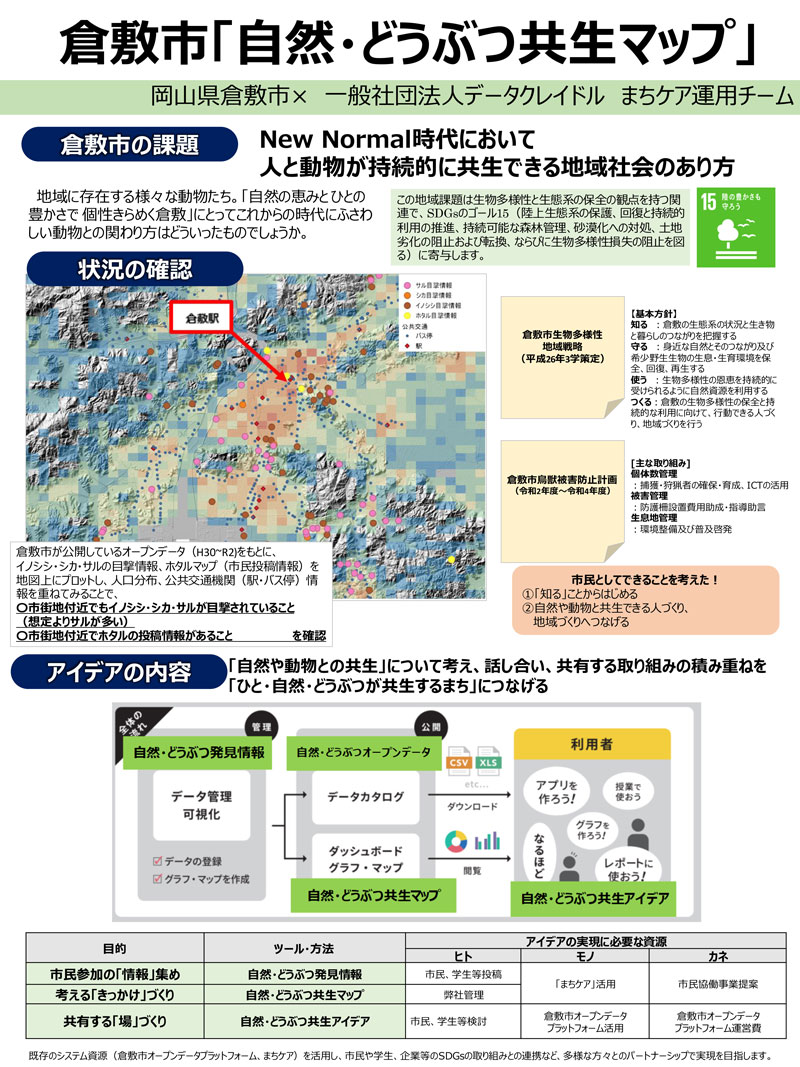
Data Cradle Incorporated Association Machi-Care Management Team
Kurashiki City, Okayama Prefecture
Regional Issues: New Normal時代において人と動物が持続的に共生できる地域社会のあり方
Idea Name: 倉敷市「自然・どうぶつ共生マップ」
 PDF
PDF
-
Computer Club, Kagawa High School attached to Ube Frontier University
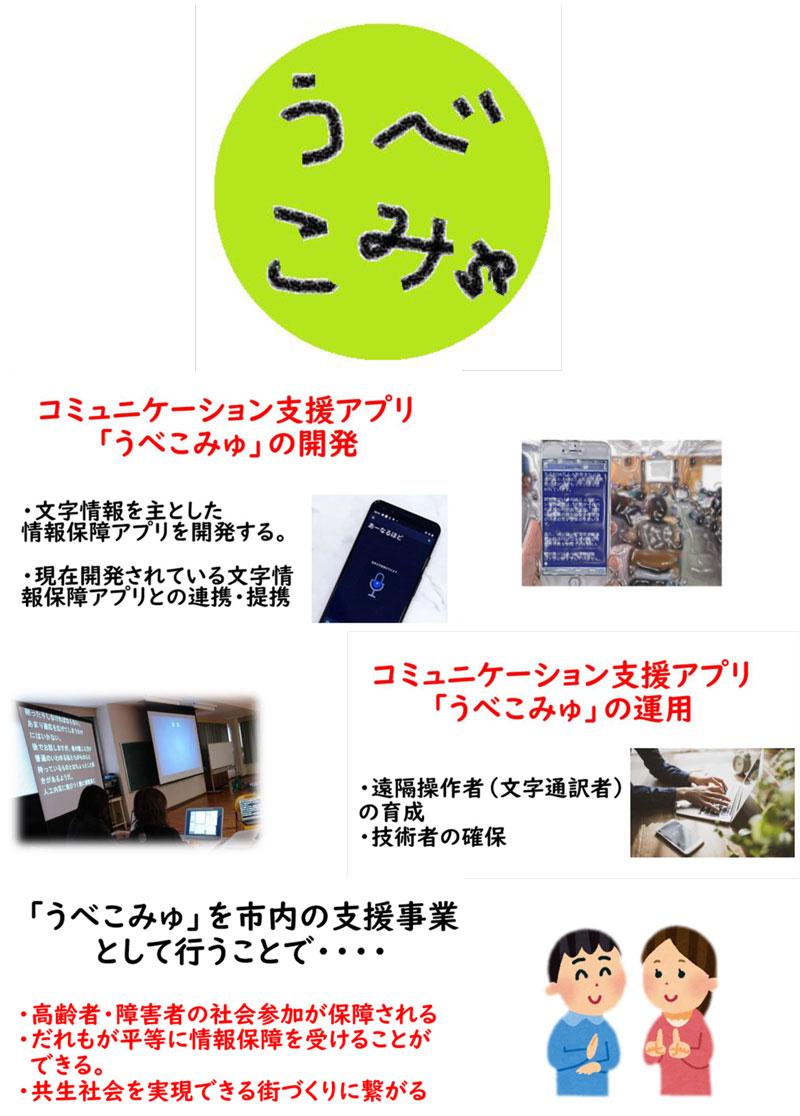
Computer Club, Kagawa High School attached to Ube Frontier University
Ube City, Yamaguchi Prefecture
Regional Issues: Ideas for a sustainable society that is not defeated by the COVID-19virus infection
Idea Name: 情報保障ビジネスプラン~みんなにやさしい街づくりを支援~
コミュニケーション支援アプリ「うべこみゅ」開発と運用 PDF
PDF
-
i-Cafe Squadron, Kitakyushu Jisso's
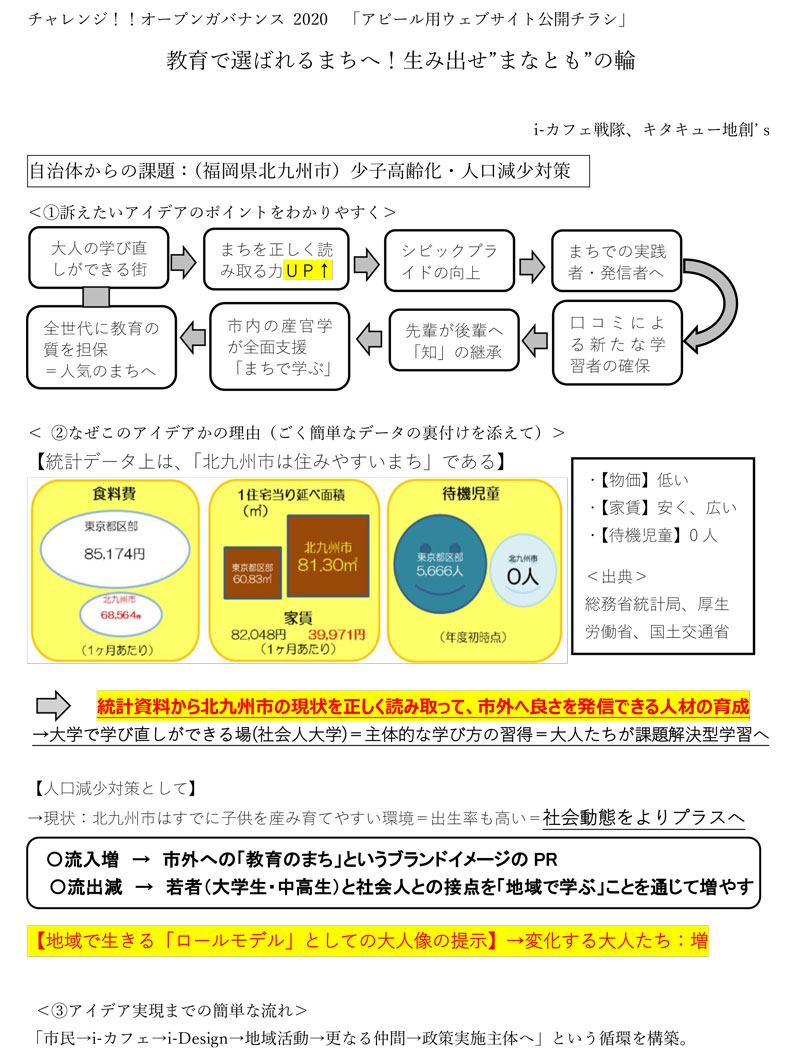
i-Cafe Squadron, Kitakyushu Jisso's
Kitakyushu City, Fukuoka Prefecture
Regional Issues: 少子高齢化・人口減少対策
Idea Name: 教育で選ばれるまちへ!生み出せ”まなとも”の輪
 PDF
PDF
22 posters to be displayed (sorted by region)
-
MuroView
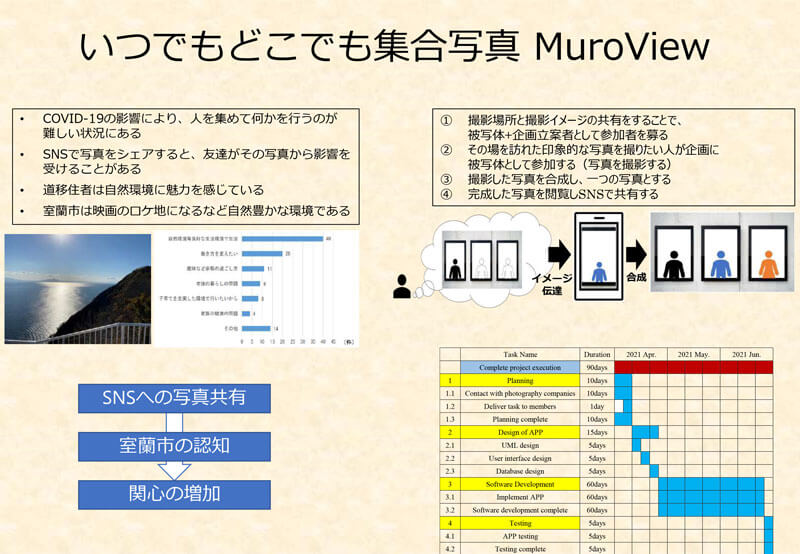
MuroView
Muroran City, Hokkaido
Regional Issues: I want you to be active and supportive in Muroran all the time! I want those of you who are active outside the city to be active in Muroran someday!
Idea Name: いつでもどこでも集合写真 MuroView
 PDF
PDF
-
Cr$Makers (CradleMakers)
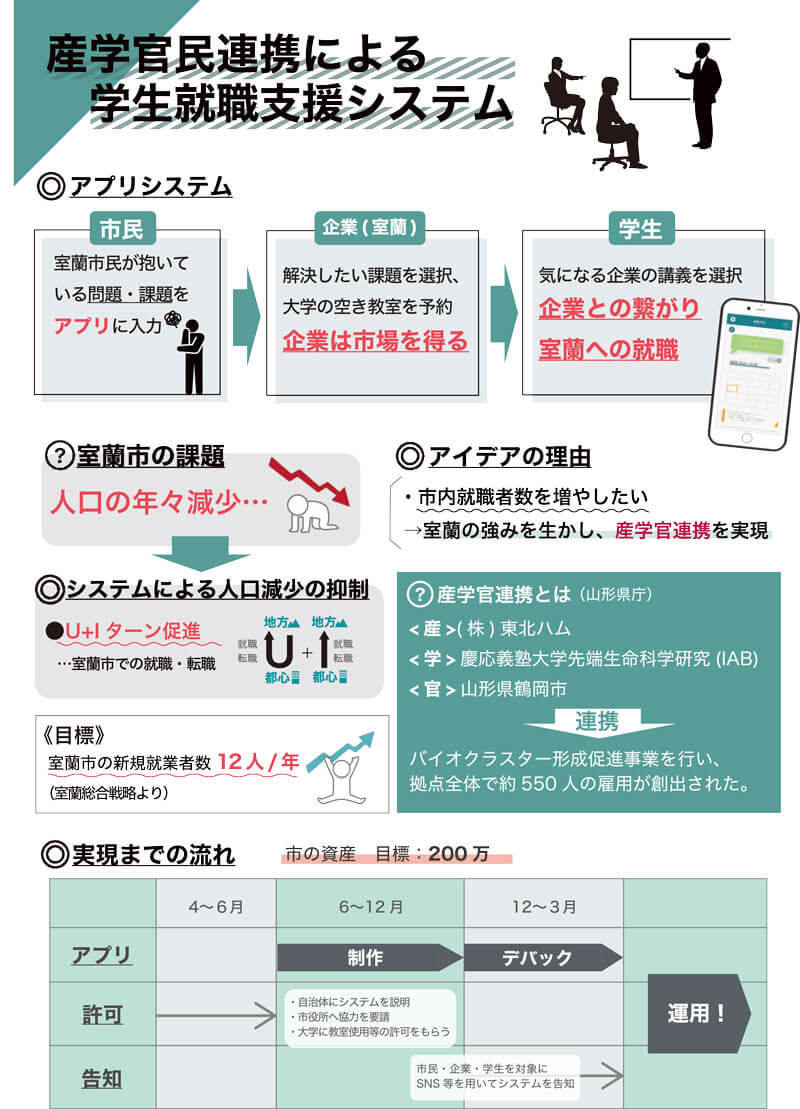
Cr$Makers (CradleMakers)
Muroran City, Hokkaido
Regional Issues: I want you to be active and supportive in Muroran all the time! I want those of you who are active outside the city to be active in Muroran someday!
Idea Name: 産学官民連携による学生就職支援システム
 PDF
PDF
-
PATH TELL
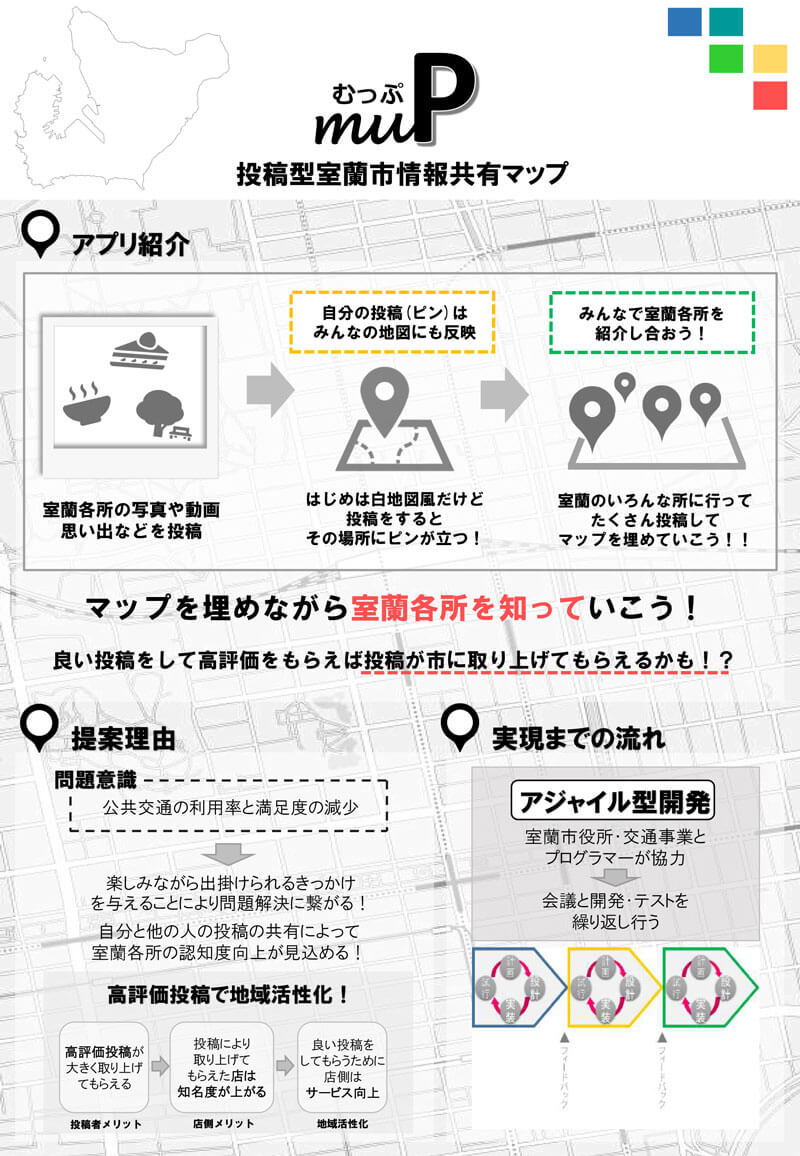
PATH TELL
Muroran City, Hokkaido
Regional Issues: Muroran's traffic needs to be more convenient!
Idea Name: 投稿型室蘭市情報共有マップ
 PDF
PDF
-
Niigata University of Law, Social Innovation (1)
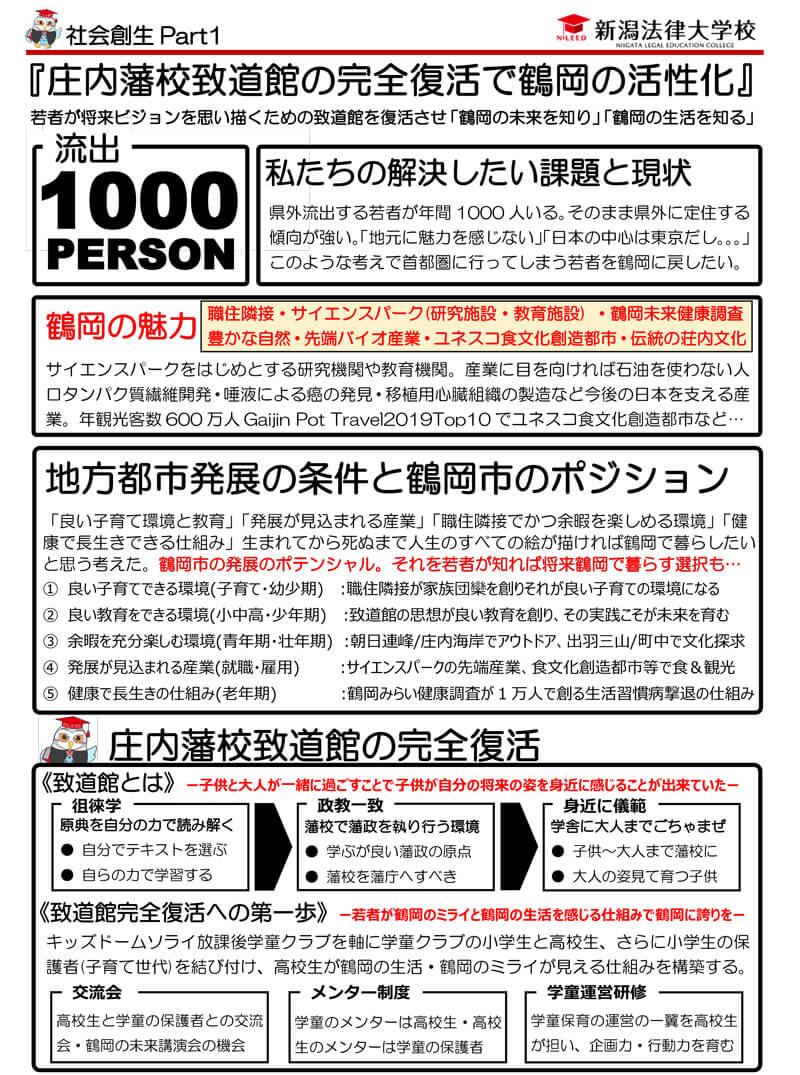
Niigata University of Law, Social Innovation (1)
Tsuruoka City, Yamagata Prefecture
Regional Issues: Developing a business plan to attract young people to Tsuruoka City
Idea Name: 鶴岡市で庄内藩藩校致道館完全復活
 PDF
PDF
-
Niigata University of Law, Social Creation (2)
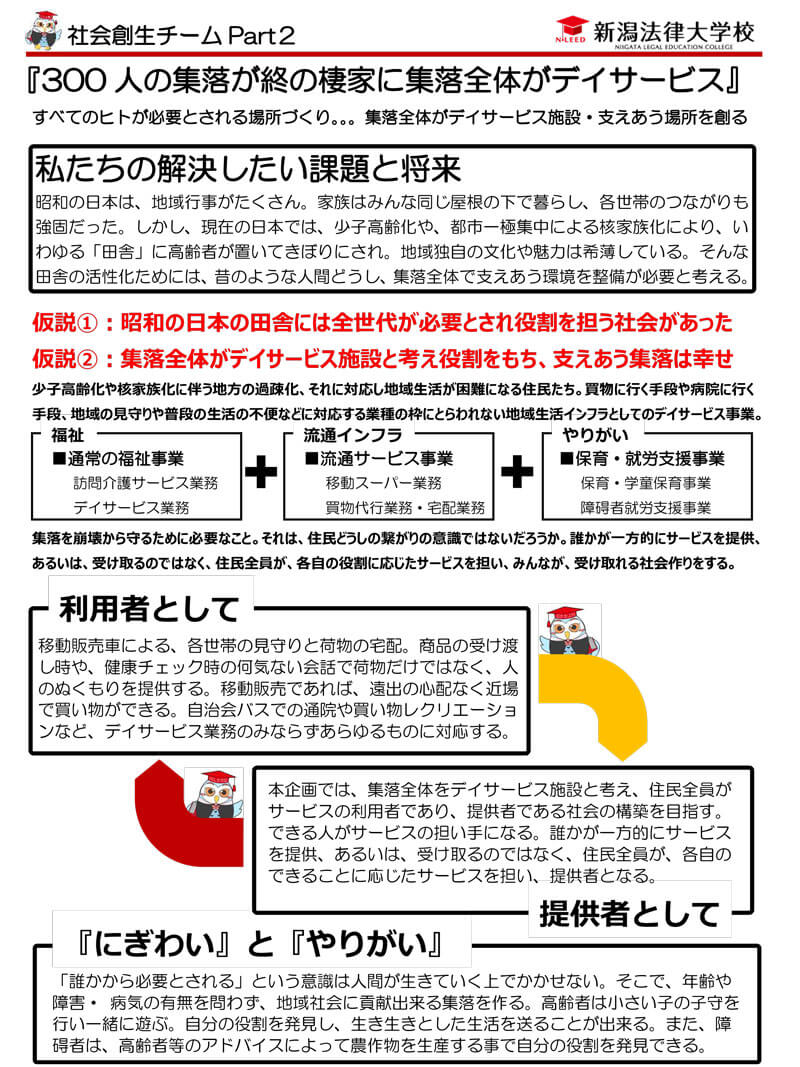
Niigata University of Law, Social Creation (2)
Tsuruoka City, Yamagata Prefecture
Regional Issues: 過疎化と高齢化の進む集落群と買い物・福祉医療等の拠点地域を効果的につなぐ方法
Idea Name: 300人の集落が終の棲家に…集落全体がデイサービス
 PDF
PDF
-
Code for Minato
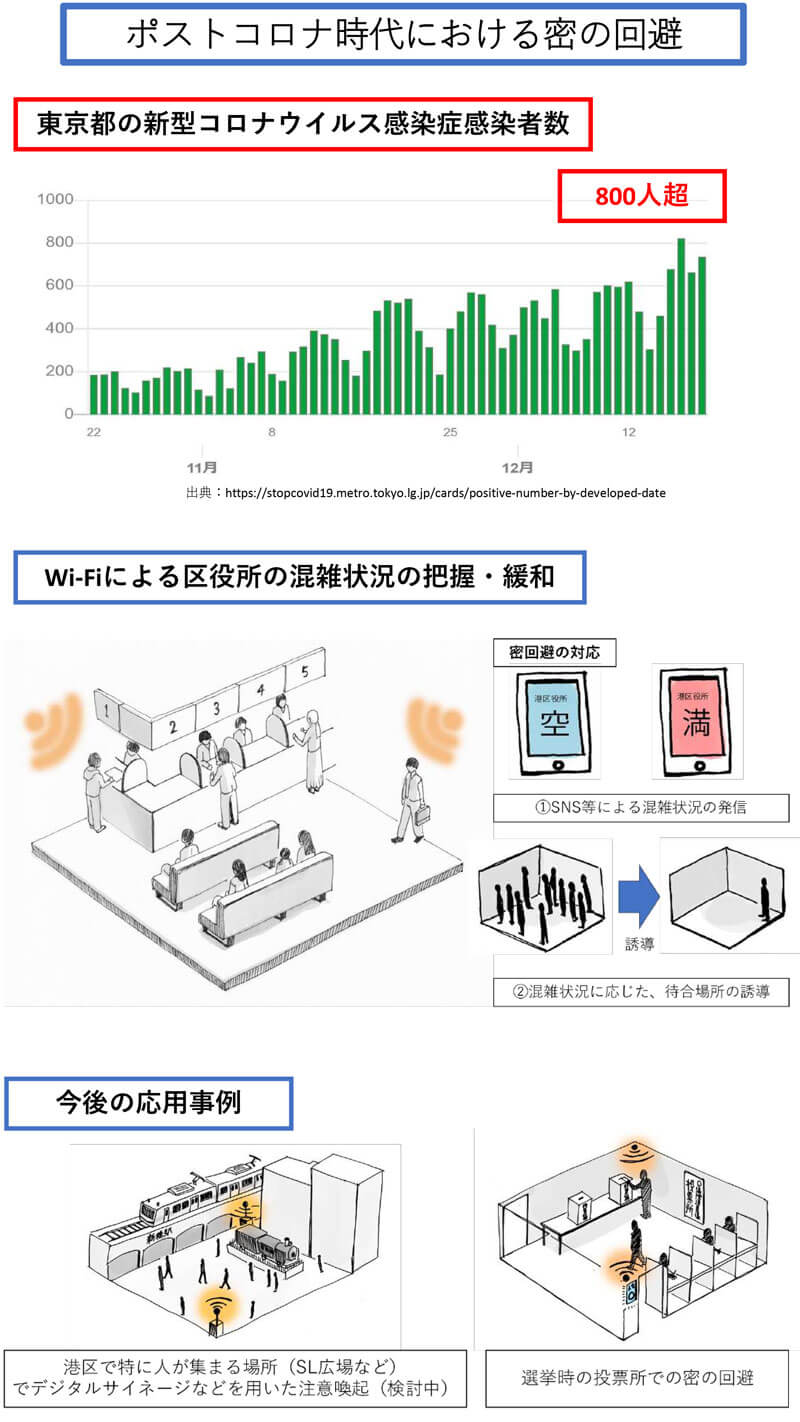
Code for Minato
Minato Ward, Tokyo
Regional Issues: 5Gを活用して港区をより楽しい、住みやすい、働きやすい、訪れやすい、過ごしやすい、魅力的な街に。
Idea Name: No Congestion Suggestion
 PDF
PDF
-
Machigraphy Lab. (Code for Nakano)
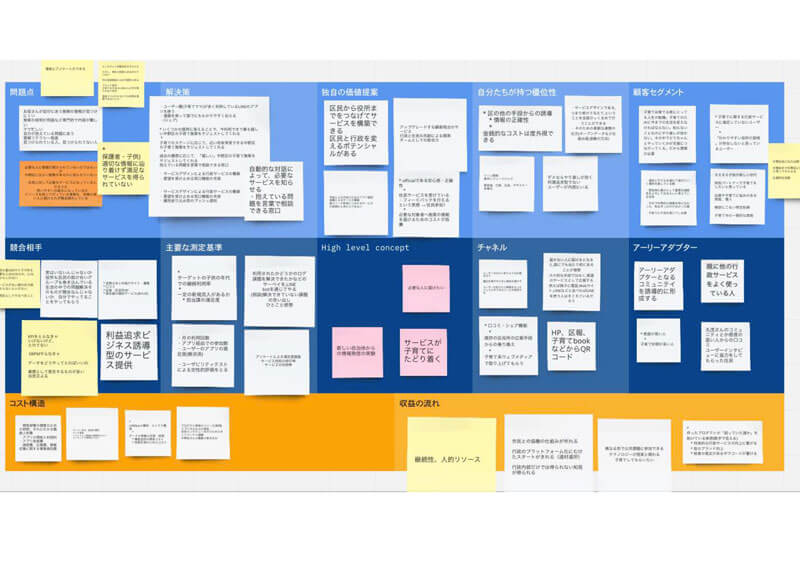
Machigraphy Lab. (Code for Nakano)
Nakano Ward, Tokyo
Regional Issues: テクノロジーを活用した区と区民との協働・協創
Idea Name: 子育て世代に適切な情報を届け、子育ち子育てを支える住民サービスに出会って欲しい!
 PDF
PDF
-
Ferris Local Community Study Group
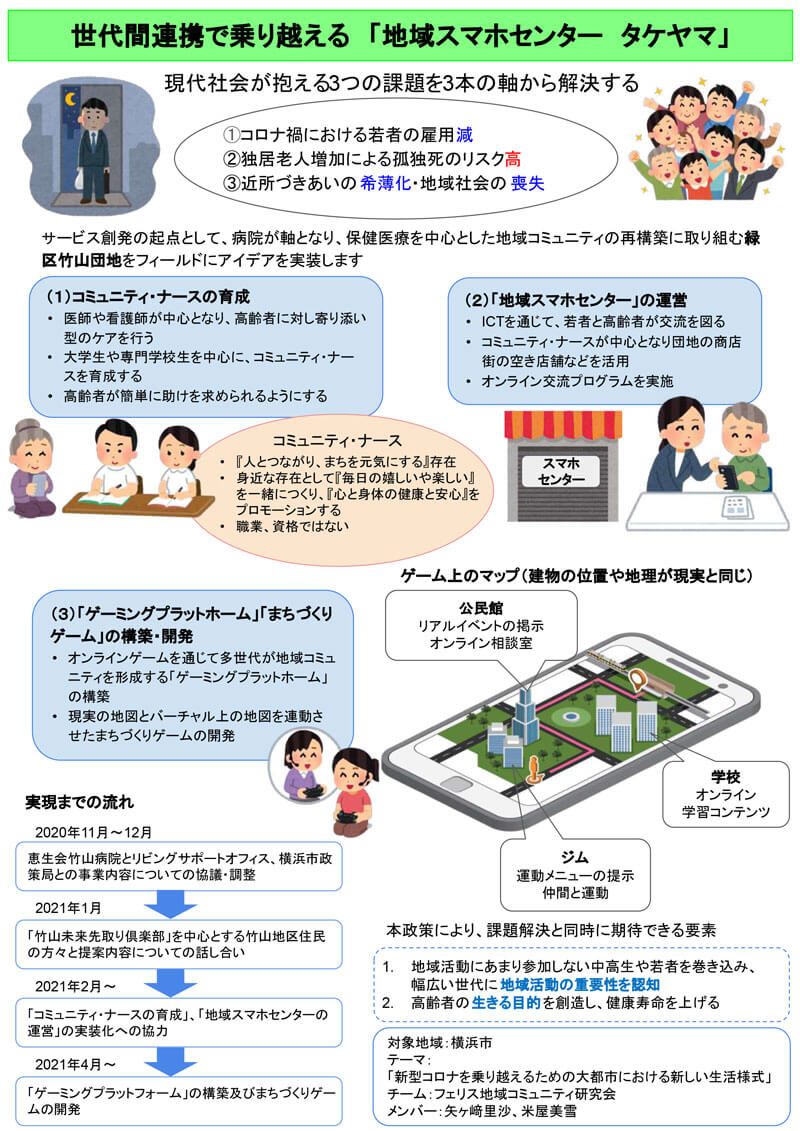
Ferris Local Community Study Group
Yokohama City, Kanagawa Prefecture
Regional Issues: Creating new lifestyles in large cities to overcome the COVID-19
Idea Name: "Regional Smartphone Center Takeyama" to overcome the Corona disaster through intergenerational cooperation
 PDF
PDF
-
Universal Tourism Desk
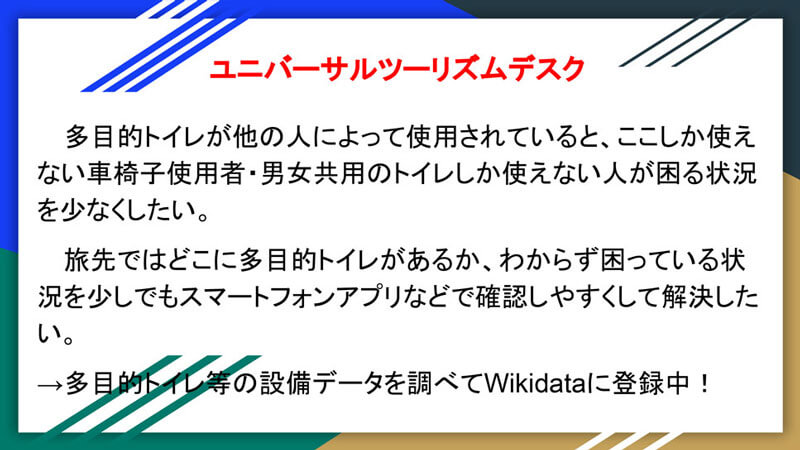
Universal Tourism Desk
Yokohama City, Kanagawa Prefecture
Regional Issues: Creating new lifestyles in large cities to overcome the COVID-19
Idea Name: Universal Tourism Desk
 PDF
PDF
-
NPO Dance Life Communications
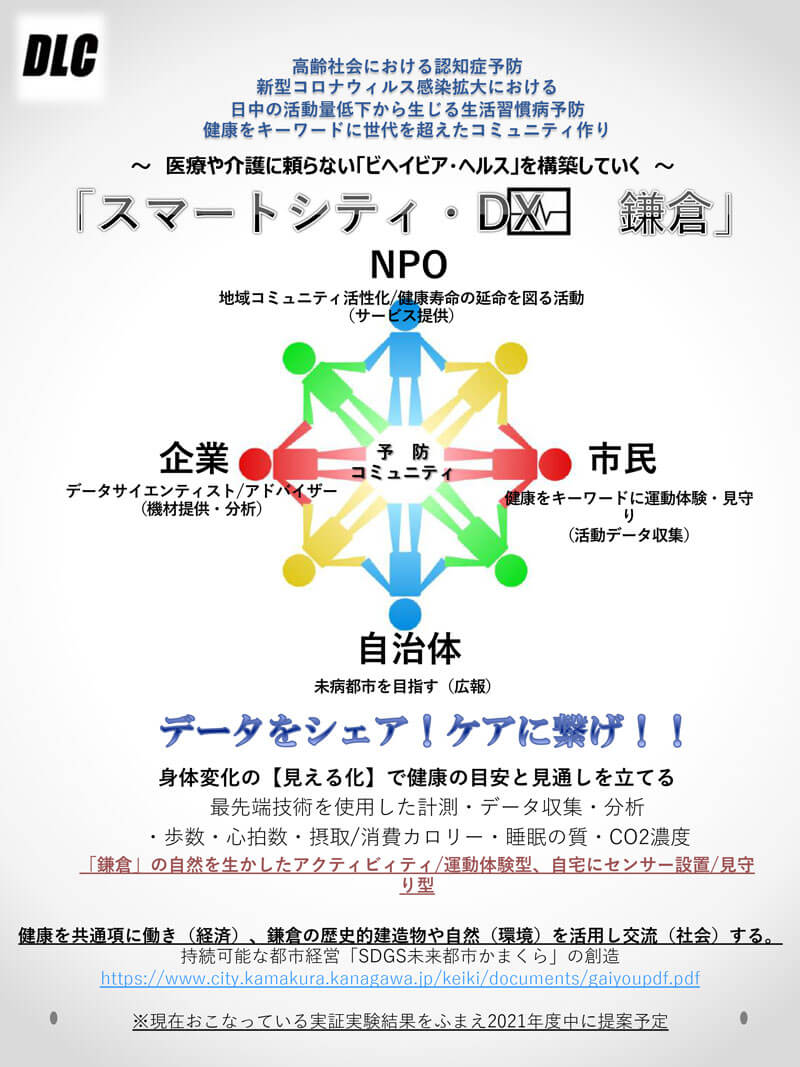
NPO Dance Life Communications
Kamakura City, Kanagawa Prefecture
Regional Issues: Realizing a "City of Work" and "Kamakura, a City Where I Want to Live and Continue to Live
Idea Name: Smart City DX Kamakura - Share the data! Connect to Care! ~ (Japanese only)
 PDF
PDF
-
Creativity Consortium
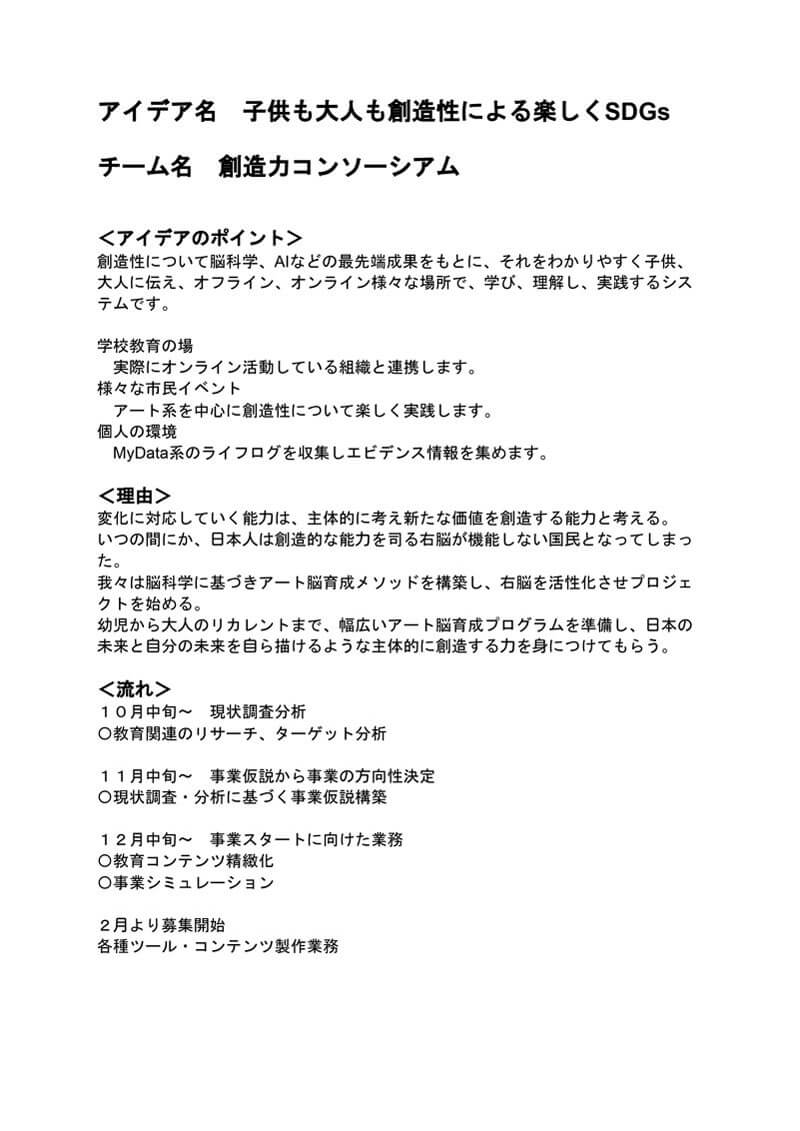
Creativity Consortium
Kamakura City, Kanagawa Prefecture
Regional Issues: Realizing "Kamakura, where all citizens can live and enjoy participating in society
Idea Name: SDGs: Fun through Creativity for Children and Adults
 PDF
PDF
-
This is the first time I've ever seen such a thing.
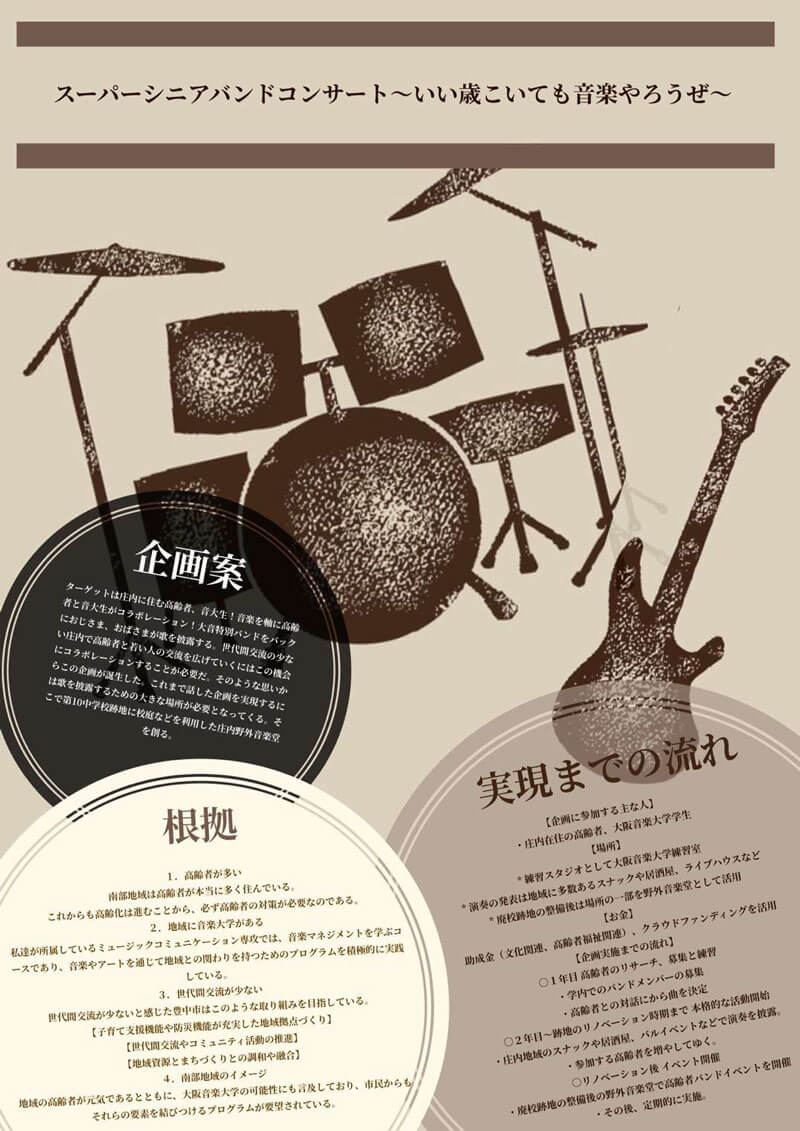
This is the first time I've ever seen such a thing.
Toyonaka City, Osaka Prefecture
Regional Issues: 地域資源を活かした小学校区のエリアマネジメントについて
Idea Name: スーパーシニアバンドコンサート〜いい歳こいても音楽やろうぜ〜
 PDF
PDF
-
Toy Land
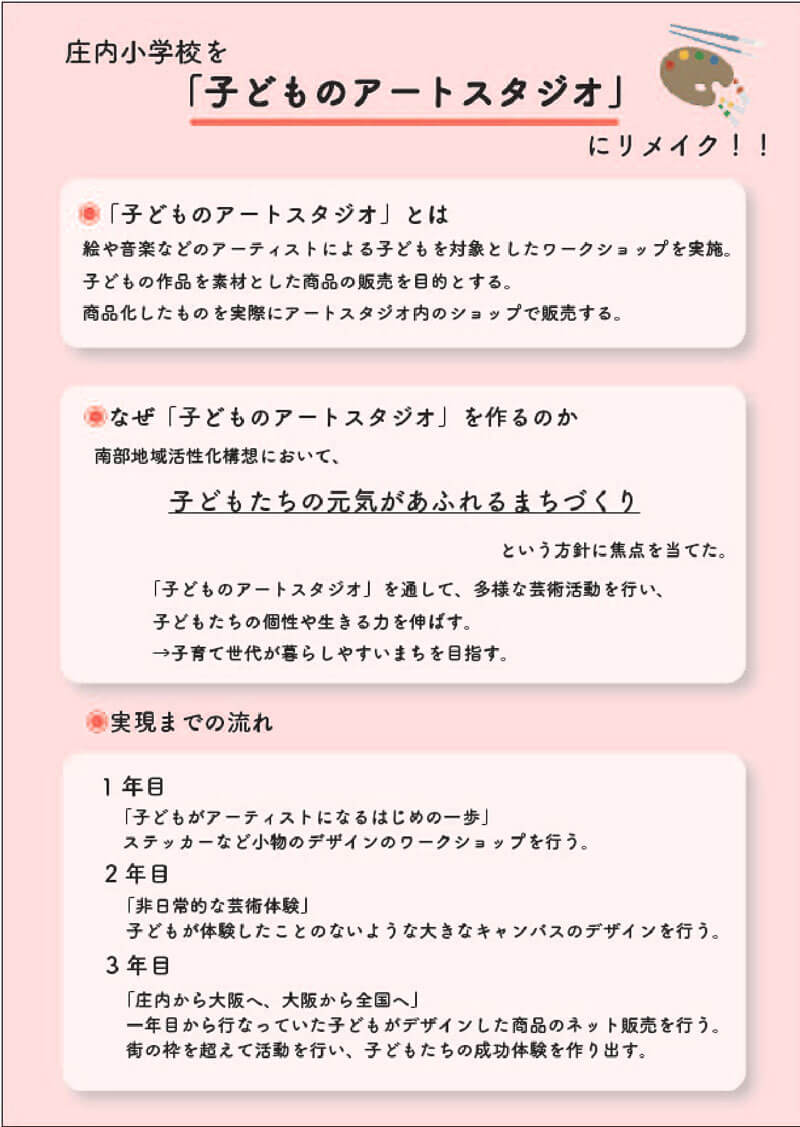
Toy Land
Toyonaka City, Osaka Prefecture
Regional Issues: 地域資源を活かした小学校区のエリアマネジメントについて
Idea Name: 庄内小学校を子どものための「子どものアートスタジオ」にリメイク!
 PDF
PDF
-
Kishigami Laboratory Mita Project Team
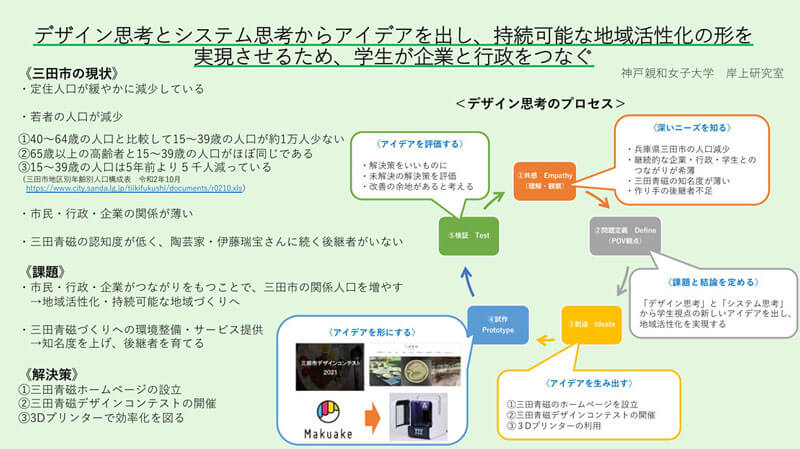
Kishigami Laboratory Mita Project Team
Sanda City, Hyogo Prefecture
Regional Issues: 兵庫県三田市を舞台とした定住人口・交流人口・関係人口の増加戦略
Idea Name: デザイン思考×システム思考で持続可能な地域活性化を実現する
 PDF
PDF
-
Disaster Prevention Signage
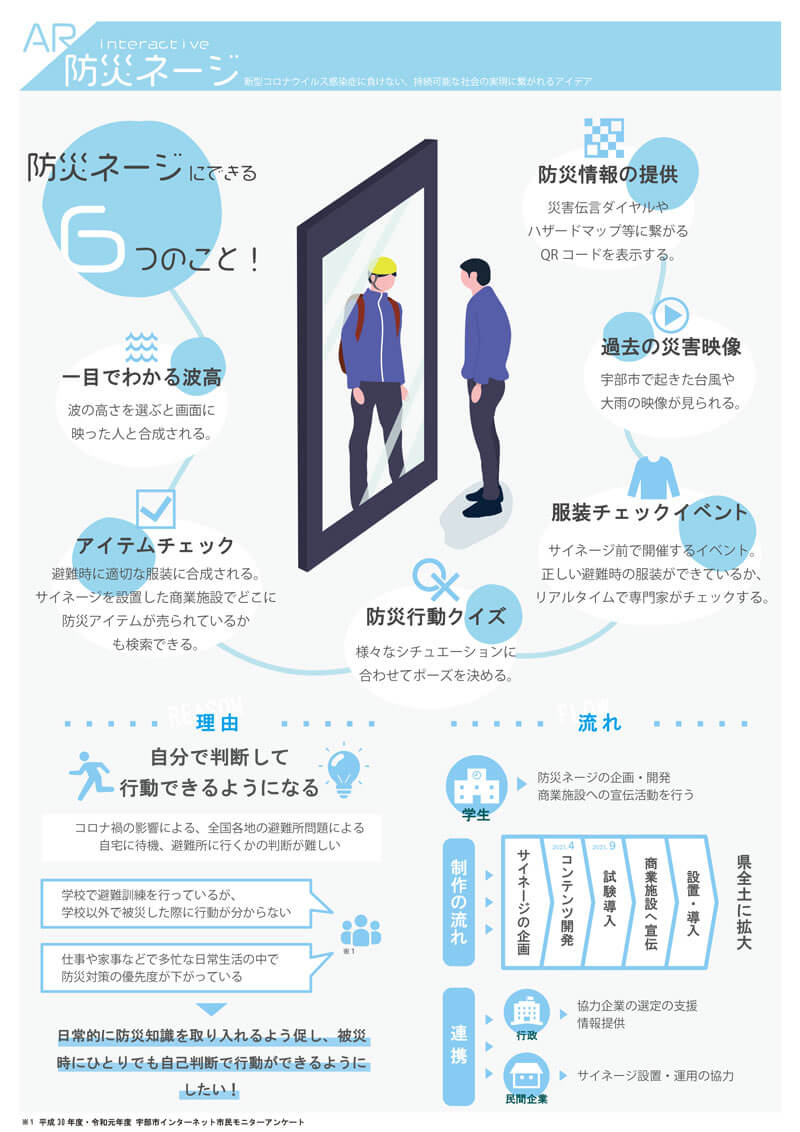
Disaster Prevention Signage
Ube City, Yamaguchi Prefecture
Regional Issues: Ideas for a sustainable society that is not defeated by the COVID-19virus infection
Idea Name: 防災ネージ
 PDF
PDF
-
Ube Street
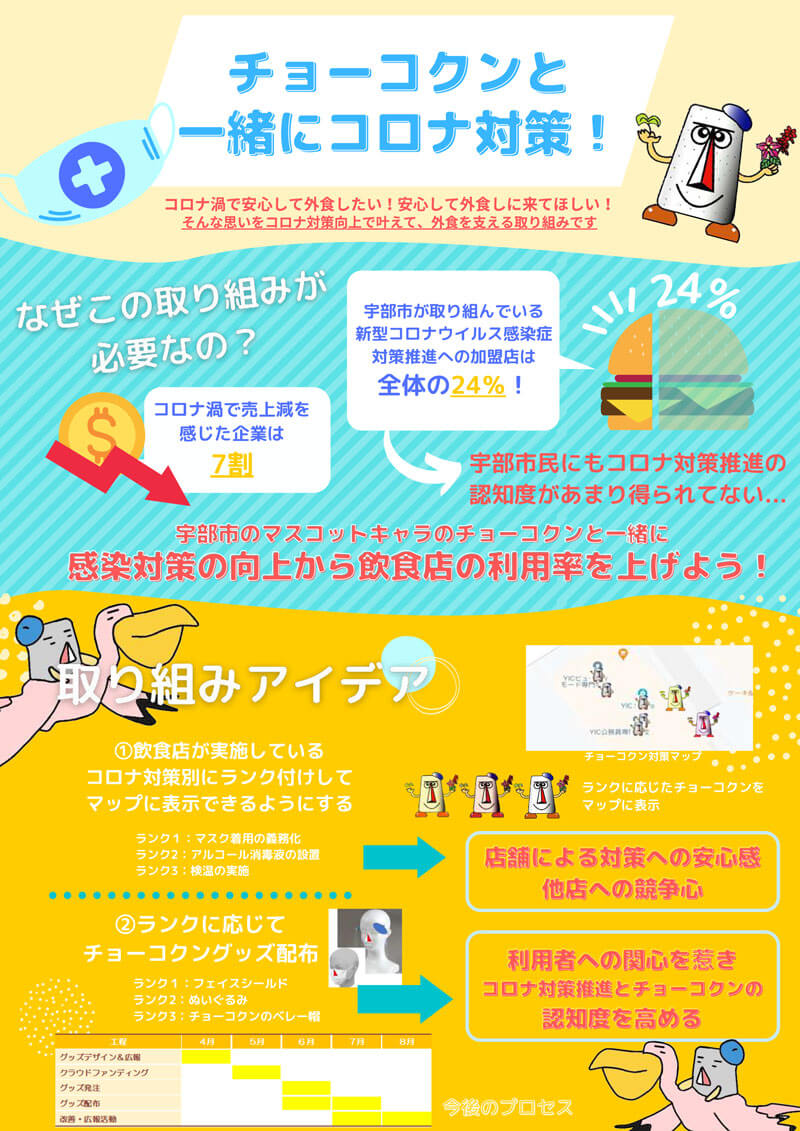
Ube Street
Ube City, Yamaguchi Prefecture
Regional Issues: Ideas for a sustainable society that is not defeated by the COVID-19virus infection
Idea Name: チョーコクンと一緒にコロナ対策!!!!!!
 PDF
PDF
-
Safety and Security Team
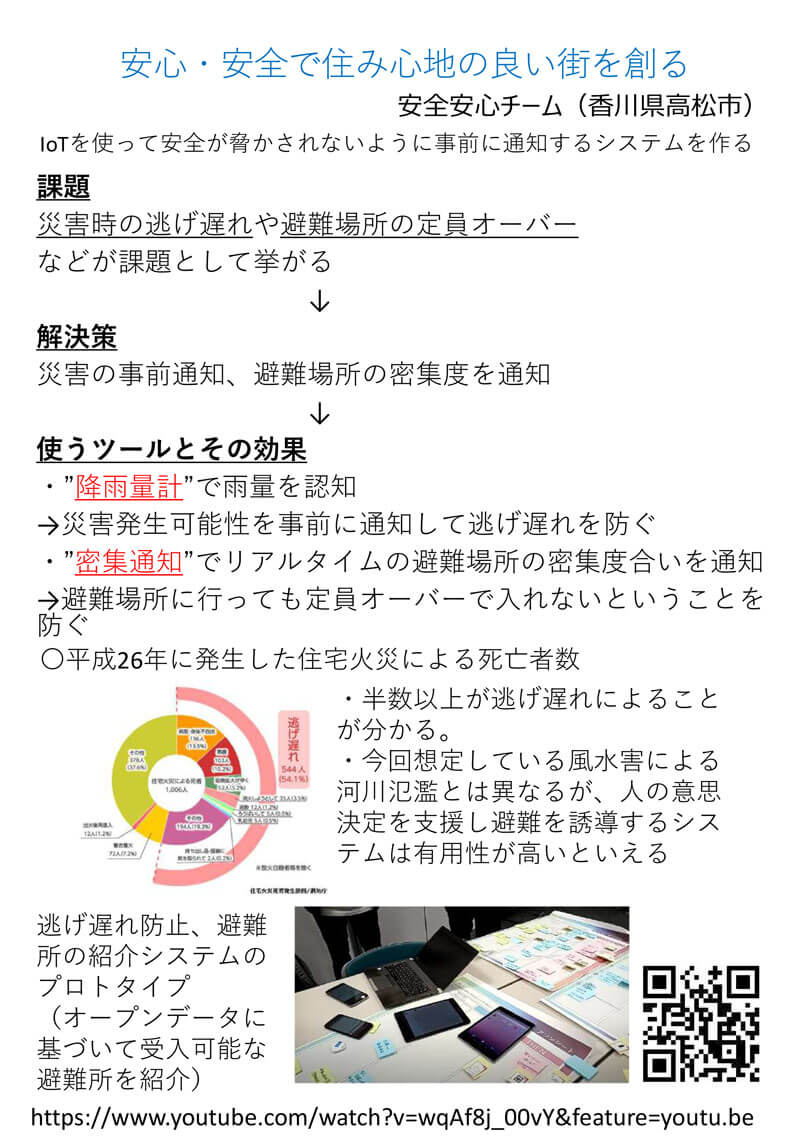
Safety and Security Team
Takamatsu City, Kagawa Prefecture
Regional Issues: 『~持続的に成長し続ける都市~ スマートシティたかまつ』の実現にむけて
Idea Name: 安全安心で住み心地の良い街を造る
 PDF
PDF
-
Trains are inconvenient, right? Leave it to us!
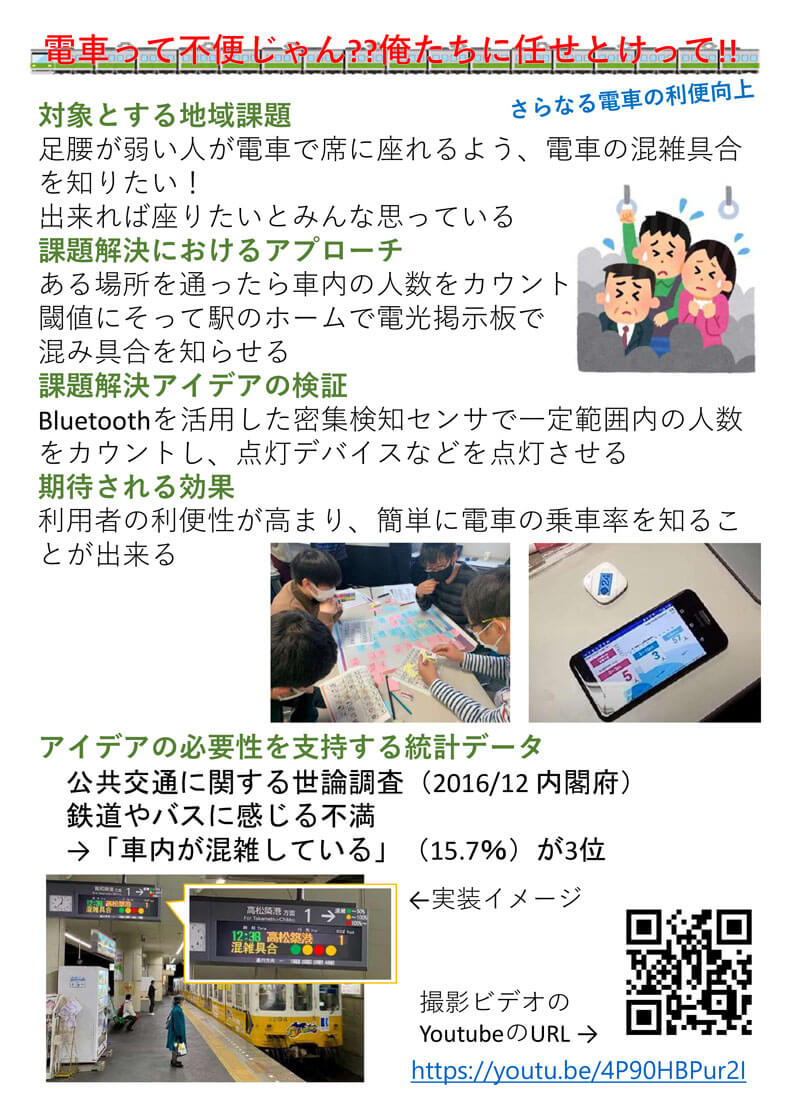
Trains are inconvenient, right? Leave it to us!
Takamatsu City, Kagawa Prefecture
Regional Issues: 『~持続的に成長し続ける都市~ スマートシティたかまつ』の実現にむけて
Idea Name: 電車って不便じゃん??俺たちに任せとけって!!(さらなる電車の利便向上)
 PDF
PDF
-
University of Kitakyushu, Kobayashi Seminar, 2nd year
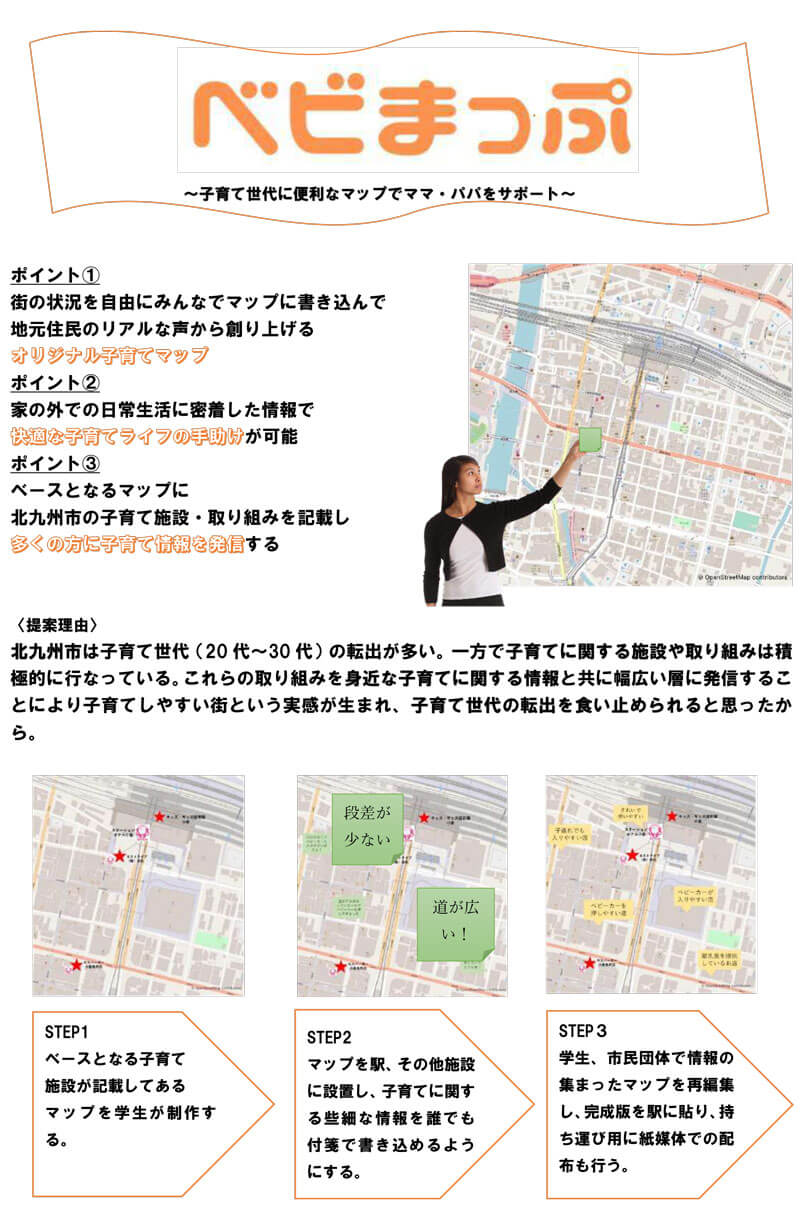
University of Kitakyushu, Kobayashi Seminar, 2nd year
Kitakyushu City, Fukuoka Prefecture
Regional Issues: 少子高齢化・人口減少対策
Idea Name: ベビまっぷを作成!子育て世代に便利な地図でママ・パパをサポート!
 PDF
PDF
-
Hot Springs in Tamana
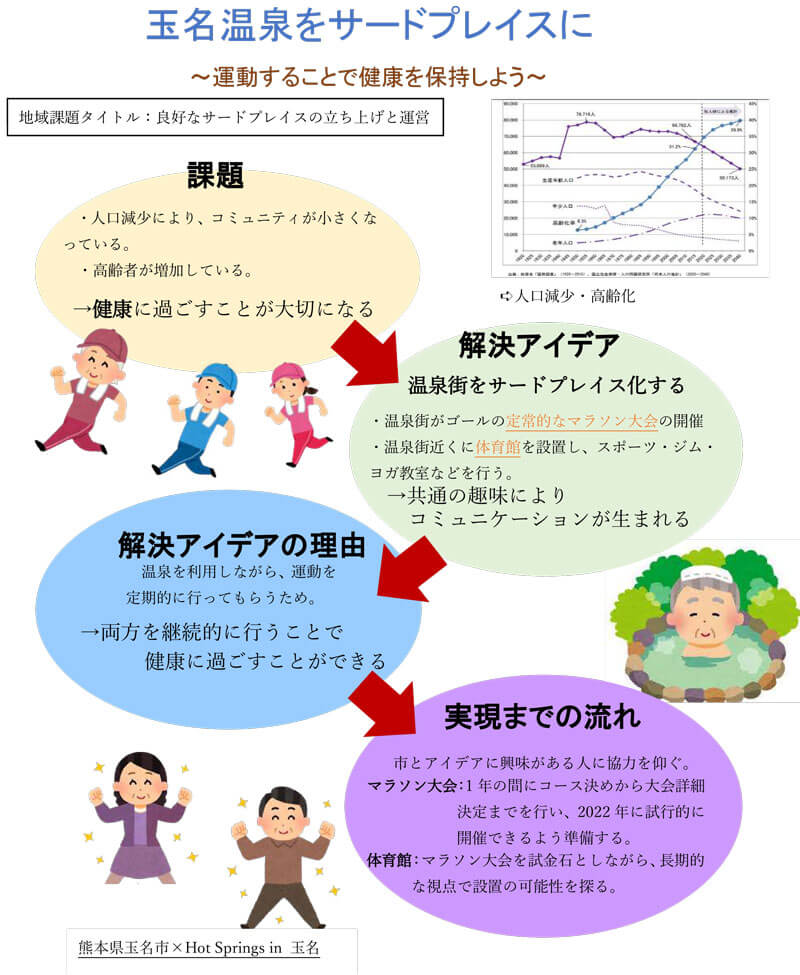
Hot Springs in Tamana
Tamana City, Kumamoto Prefecture
Regional Issues: Starting and managing a good third place
Idea Name: 玉名温泉をサードプレイスに~運動することで健康を保持しよう~
 PDF
PDF
-
Team Culture
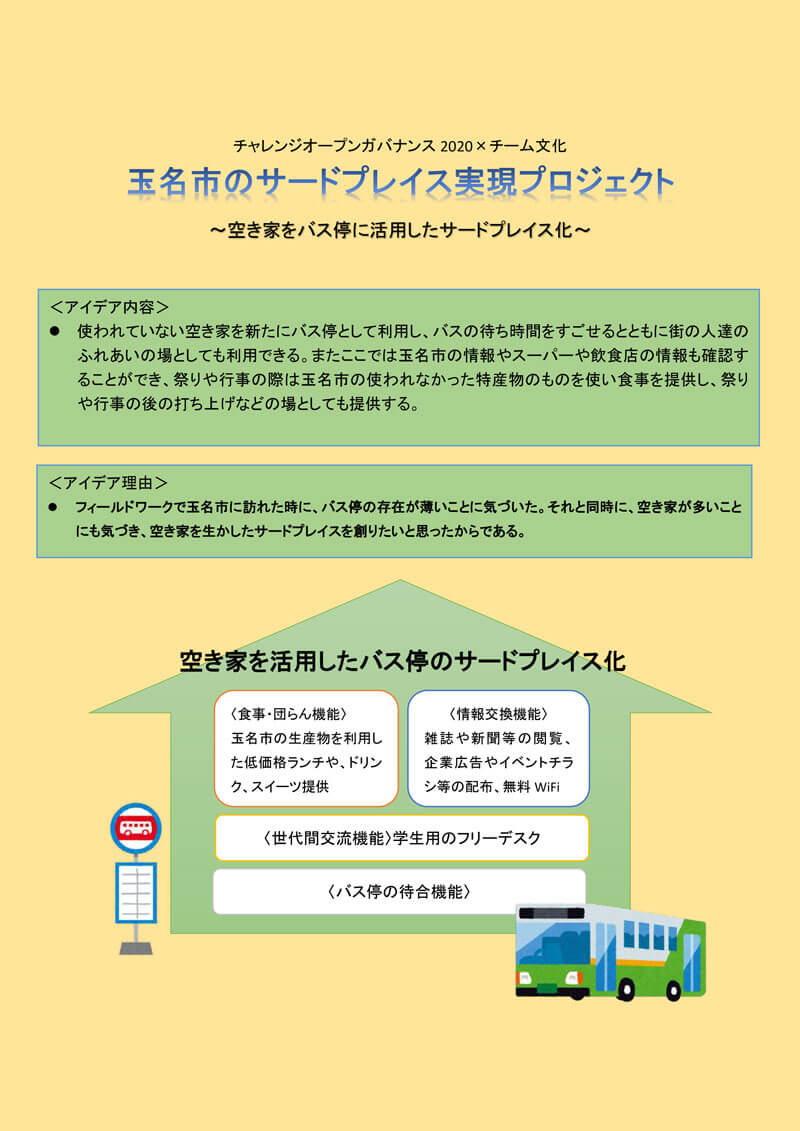
Team Culture
Tamana City, Kumamoto Prefecture
Regional Issues: Starting and managing a good third place
Idea Name: 空き家をバス停に活用したサードプレイス化
 PDF
PDF
-
Third Place in Tamana City
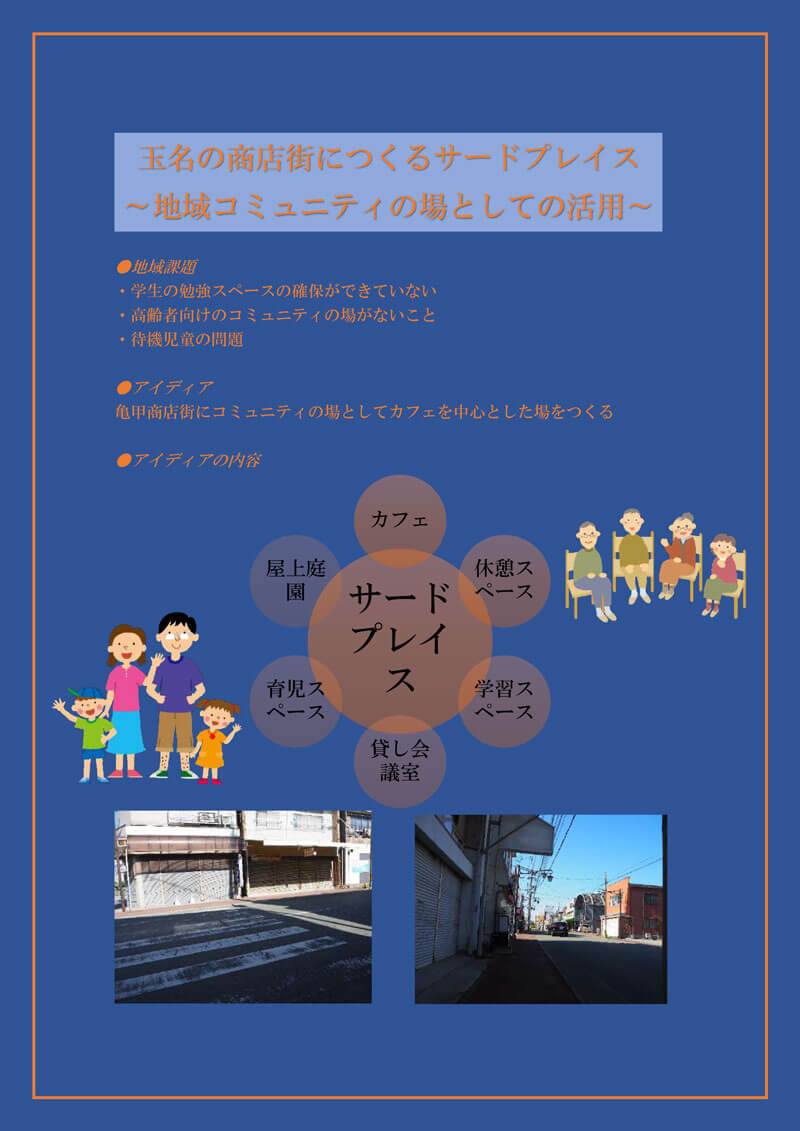
Third Place in Tamana City
Tamana City, Kumamoto Prefecture
Regional Issues: Starting and managing a good third place
Idea Name: 商店街にサードプレイスの場をつくる
 PDF
PDF



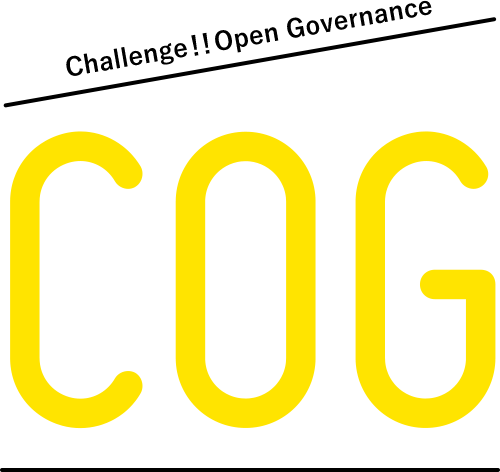



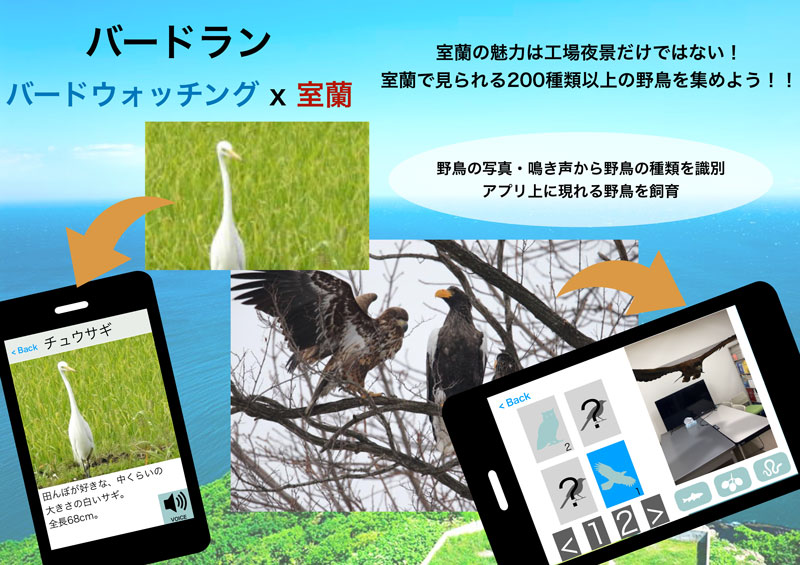 Flyer
Flyer
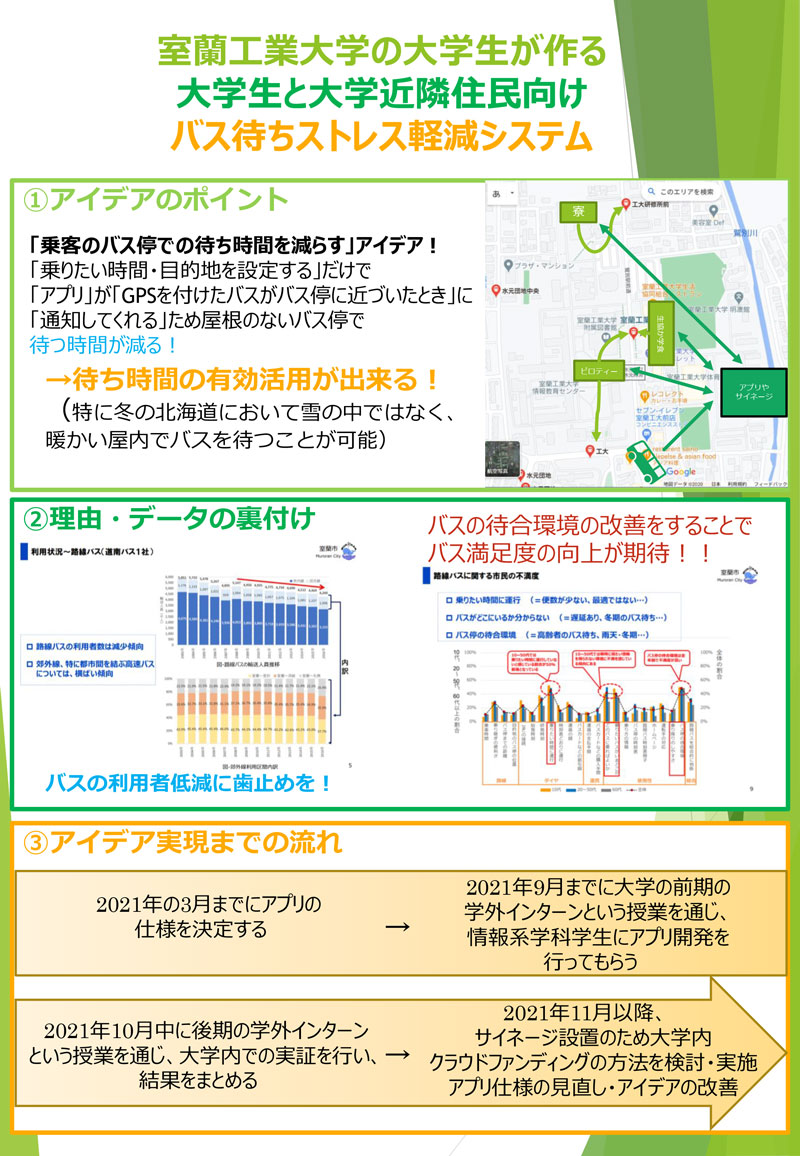 Flyer
Flyer
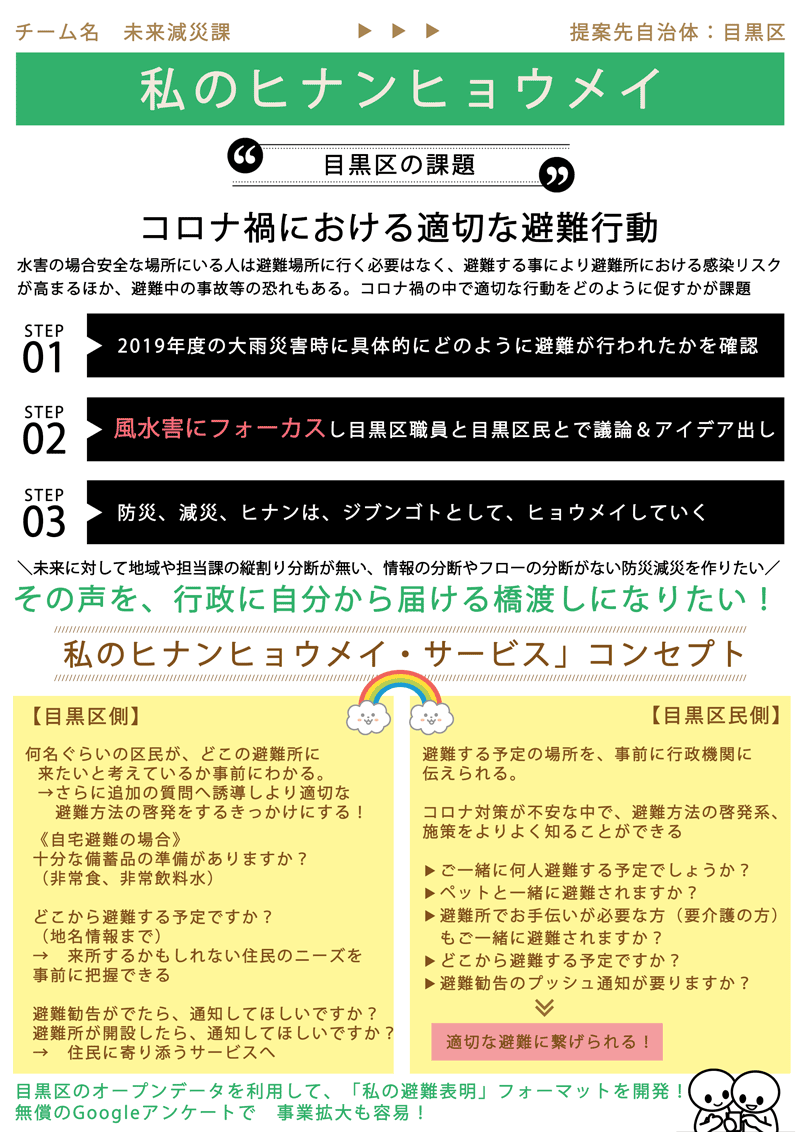 Flyer
Flyer
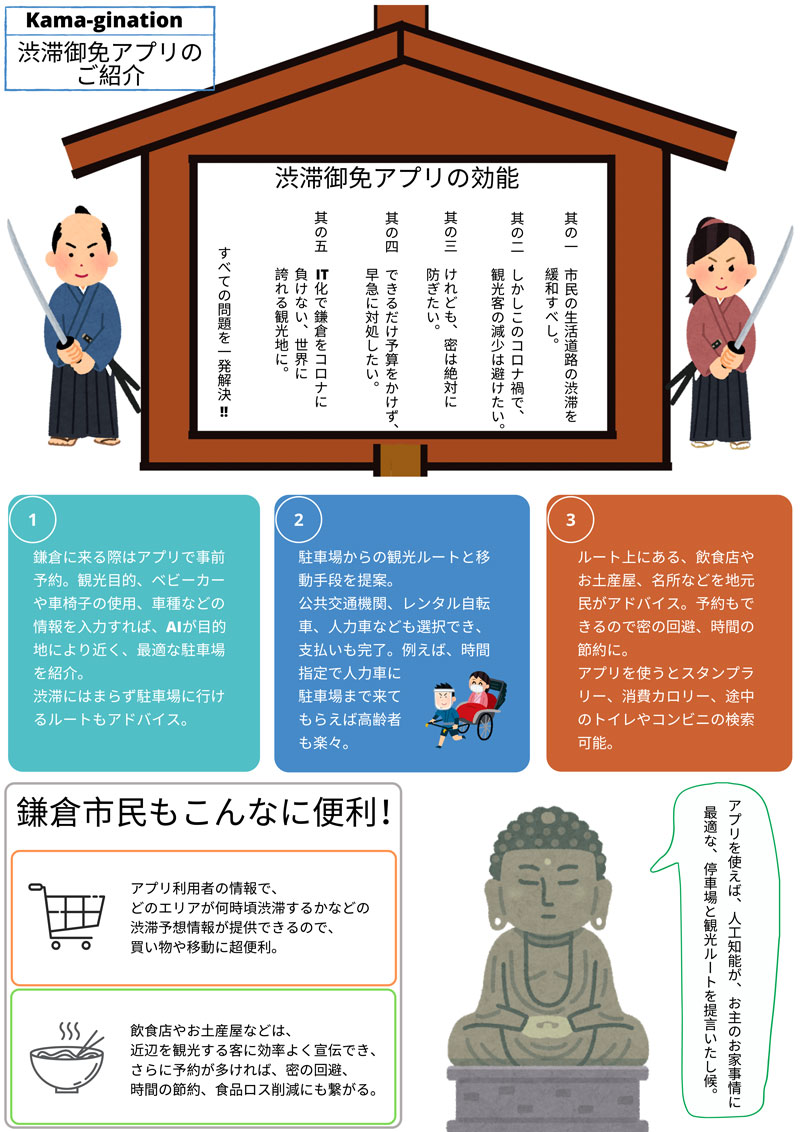 Flyer
Flyer
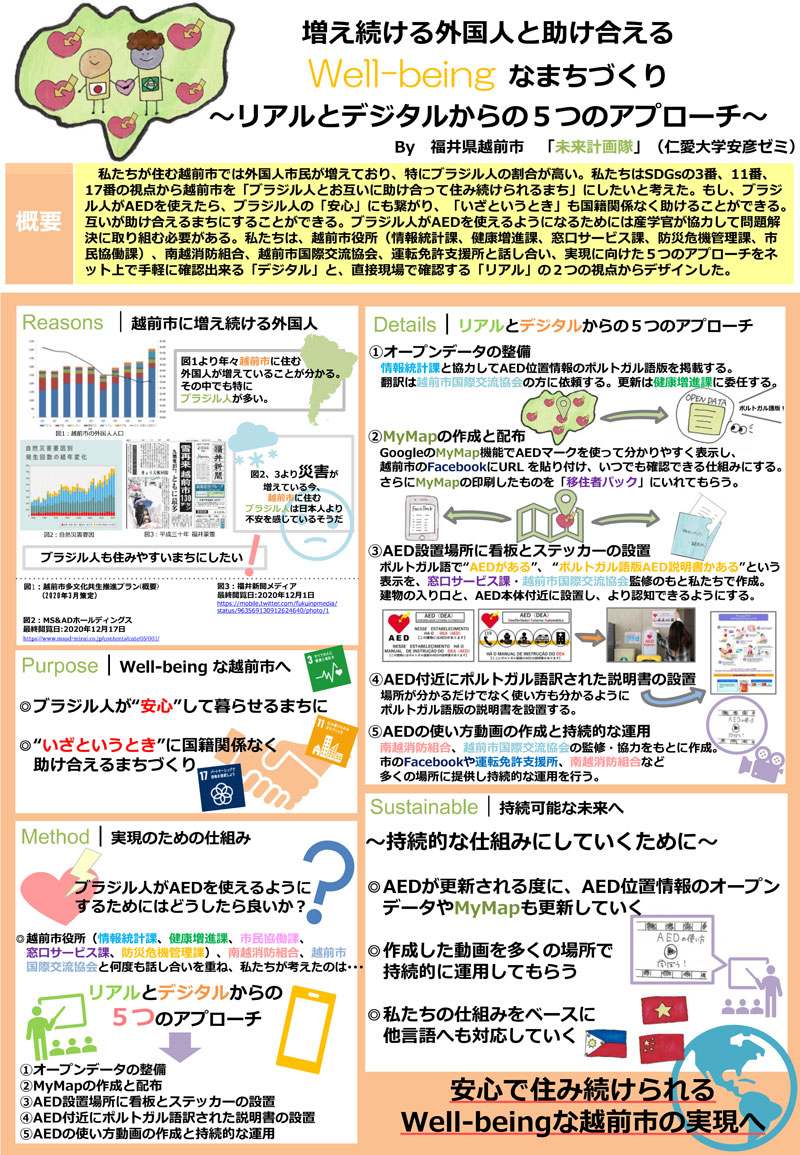 Flyer
Flyer
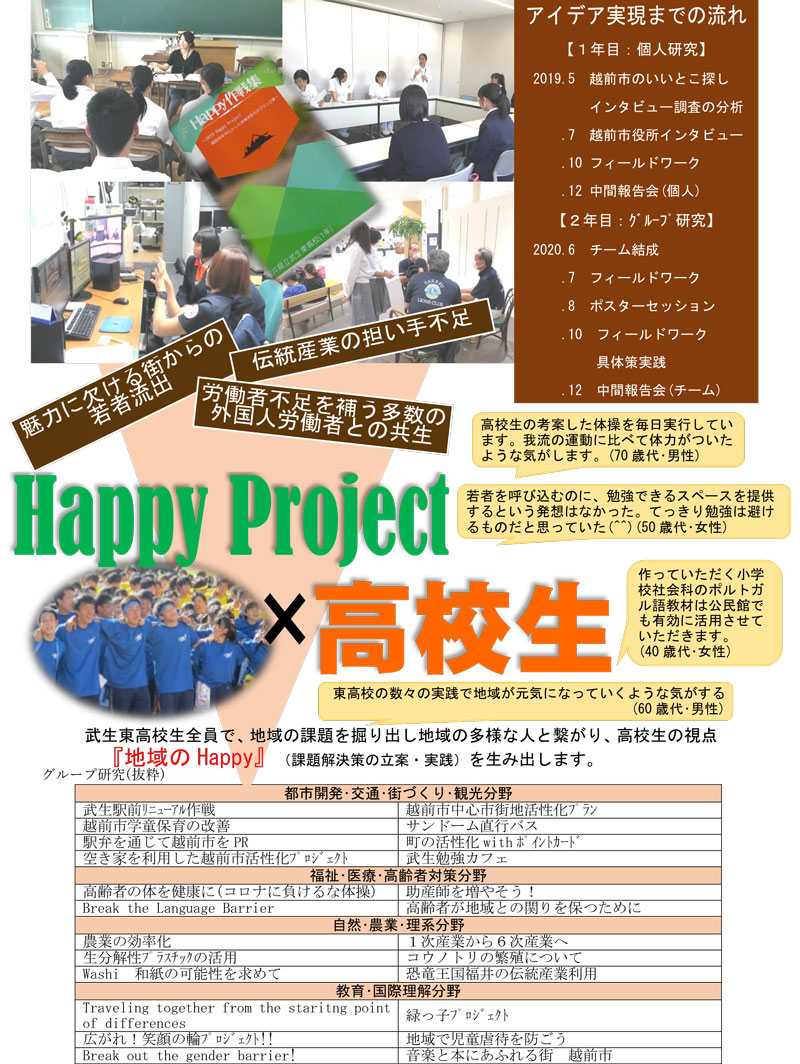 Flyer
Flyer
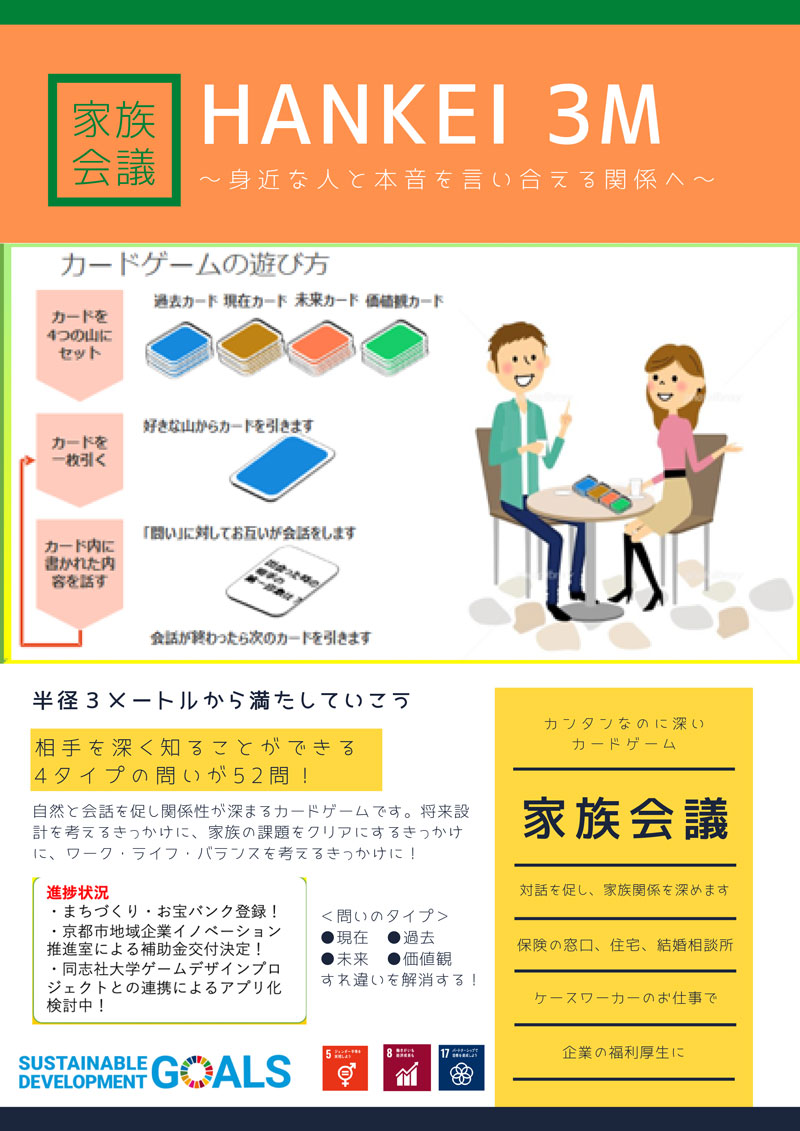 Flyer
Flyer
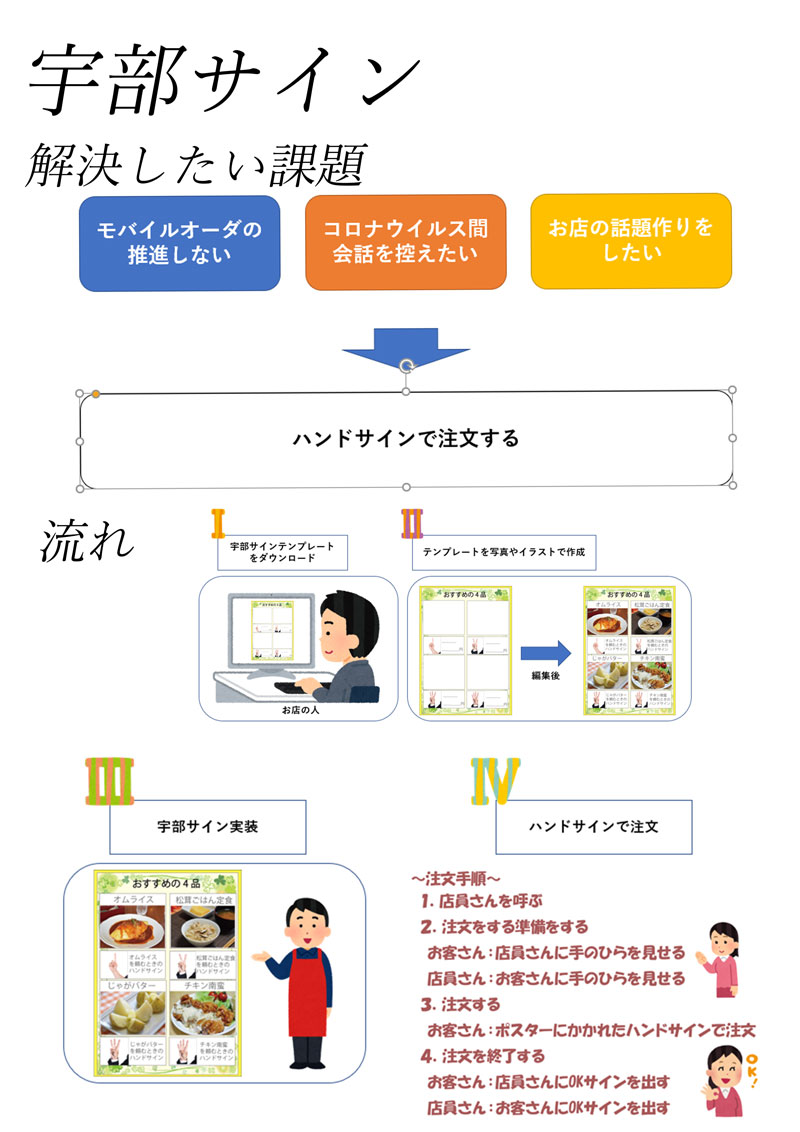 Flyer
Flyer
 Flyer
Flyer
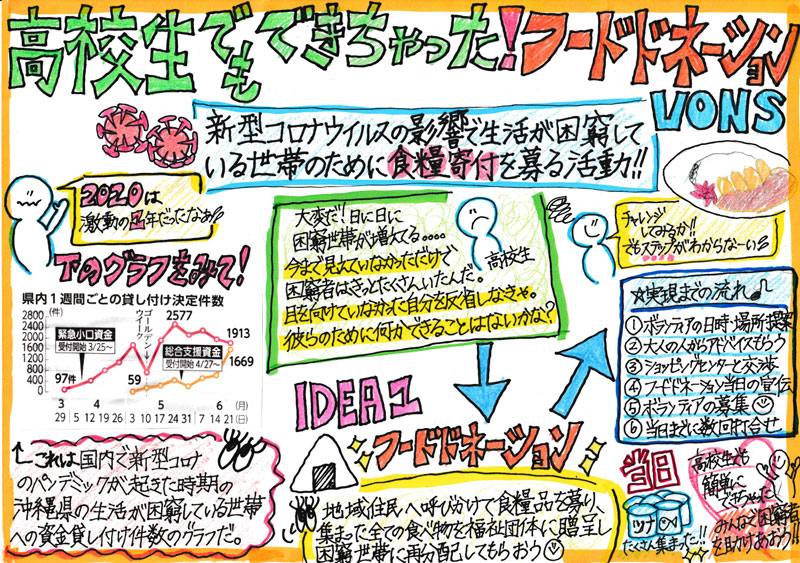 Flyer
Flyer

